SUPPLY CHAIN
Discovering new markets: Savoye expands in the MENA
Reverse logistics for a successful circular economy
Meeting the demand: Online grocery shopping services


SUPPLY CHAIN
Discovering new markets: Savoye expands in the MENA
Reverse logistics for a successful circular economy
Meeting the demand: Online grocery shopping services

AL FARIS GROUP TAKES DELIVERY OF TWO MERCEDES-BENZ AROCS 4058 AS 6X6 SLT VEHICLES FROM EMIRATES MOTOR COMPANY
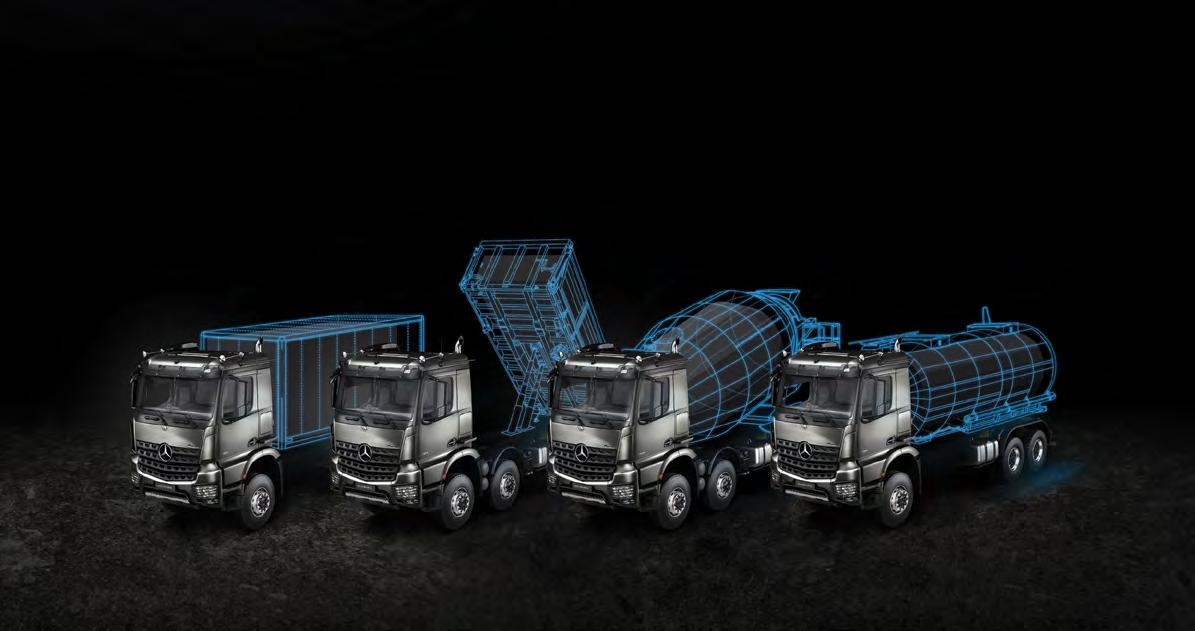
Regardless of whether it is a rigid chassis, concrete mixer or heavy-duty tipper: The Mercedes-Benz Arocs provides an especially robust, resilient vehicle that is optimally prepared for use for any construction haulage challenge. Configure it now to suit your requirements and those of your project.

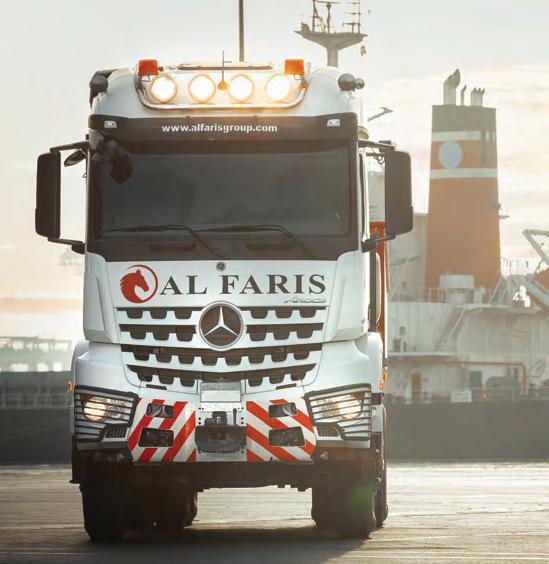


18
‘A ROC’K SOLID PROPOSITION
Al Faris Group recently took delivery of two MercedesBenz Arocs 4058 AS 6x6 SLT vehicles from Emirates Motor Company - we find out what makes these robust heavy-duty tractor units valuable assets
14
E-COMMERCE
BRIDGING THE GAP
CEO and Founder of Elli Junior, Elli Kasbi reveals how she’s bringing high-quality, premium, and sustainable baby clothing to the region
16
SUPPLY CHAIN
DISCOVERING NEW MARKETS
Savoye recently announced plans to expand in the Middle East. Managing Director Frederic Zielinski, tells us how and why they wish to foray into this market
26
OPERATION & MAINTENANCE
KEEPING DUBAI ON THE MOVE
Tamer Salama, Alstom GCC, Managing Director, reveals how excited the team is to build upon its relationship with Dubai Airports with this new five-year O&M agreement
28
EXPERT INSIGHT REVERSE LOGISTICS
Mohammad Sleiman, Founder & CEO at Cartlow, writes how reverse logistics is essential to eCommerce and a successful circular economy model
30
E-COMMERCE MEETING THE DEMAND
Rick Malhotra, Finance Director, Elfab Co, shares how the pandemic has accelerated the demand for online grocery shopping services
32
HUMANITARIAN LOGISTICS
LEVERAGING SMART SOLUTIONS
Dr. Shereen Nassar, Global Director of Logistics Studies and the Director of the MSc Logistics and Supply Chain Management ProgrammeEdinburgh Business School, Heriot-Watt University Dubai

As we near the half-year mark, I must say I am quite pleased with how the economy is bouncing back. There’s positive news everywhere – Emirates Post set up a dedicated 33,475 sqft eCommerce facility in Dubai South’s Logistics District, Etihad Rail is manufacturing sleeper locally to boost the economy, and Middle Eastern carriers posted a 9.2% rise in
international cargo volumes in March 2021 versus March 2019, according to IATA. The next few months is going to be crucial for our industry as we gear up to welcome the Expo 2020 Dubai and the benefits it brings. The emirate continues to attract foreign investors and companies despite the pandemic and its impact.
French logistics solutions engineering company Savoye has recently set up a base in Dubai and has plans to further expand in the region. The regional managing director tells us why Dubai is an attractive proposition for the firm.
With the launch of Logistics District in Dubai South and the Al Maktoum International Airport currently being used as a cargo only airport, there’s a lot more in the pipeline for the logistics industry in Dubai and the UAE.
Fujairah Terminal’s Dhs1 billion expansion programme is going to further accelerate the UAE’s growth as a logistics hub. The revamped terminal now features infrastructure developments and enhanced services. We’ll give you the details in the next issue.
Jochebed Menon
Editor, Logistics News Middle East jochebed@bncpublishing.net
In the April 2021 issue, LetsTango.com was erroneously misspelled. We regret the inconvenience.


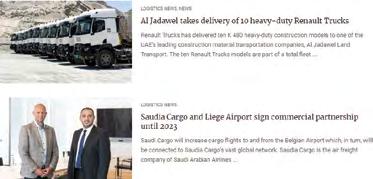
CEO Wissam Younane wissam@bncpublishing.net
DIRECTOR
Rabih Najm rabih@bncpublishing.net
GROUP PUBLISHING DIRECTOR
Joaquim D'Costa jo@bncpublishing.net +971 50 440 2706
BUSINESS DEVELOPMENT DIRECTOR
Rabih Naderi rabih.naderi@bncpublishing.net +966 50 328 9818
MANAGING EDITOR Kasun Illankoon kasun@bncpublishing.net
EDITOR Jochebed Menon
EDITORIAL DESIGN
Christian Harb
MARKETING EXECUTIVE
Aaron Joshua Sinanbam aj@bncpublishing.net
PHOTOGRAPHER
Alexander Bungas
subscriptions@bncpublishing.net
For all commercial enquiries, contact sales@bncpublishing.net T +971 50 440 2706 PO Box 502511 Dubai, United Arab Emirates P +971 4 4200 506 | F +971 4 4200 196
All rights reserved © 2021.
Opinions expressed are solely those of the contributors.
Logistics News ME and all subsidiary publications in the MENA region are officially licensed exclusively to BNC Publishing in the MENA region by Logistics News ME. No part of this magazine may be reproduced or transmitted in any form or by any means without written permission of the publisher.
Images used in Logistics News ME are credited when necessary. Attributed use of copyrighted images with permission. All images not credited courtesy Shutterstock.
Printed by UPP
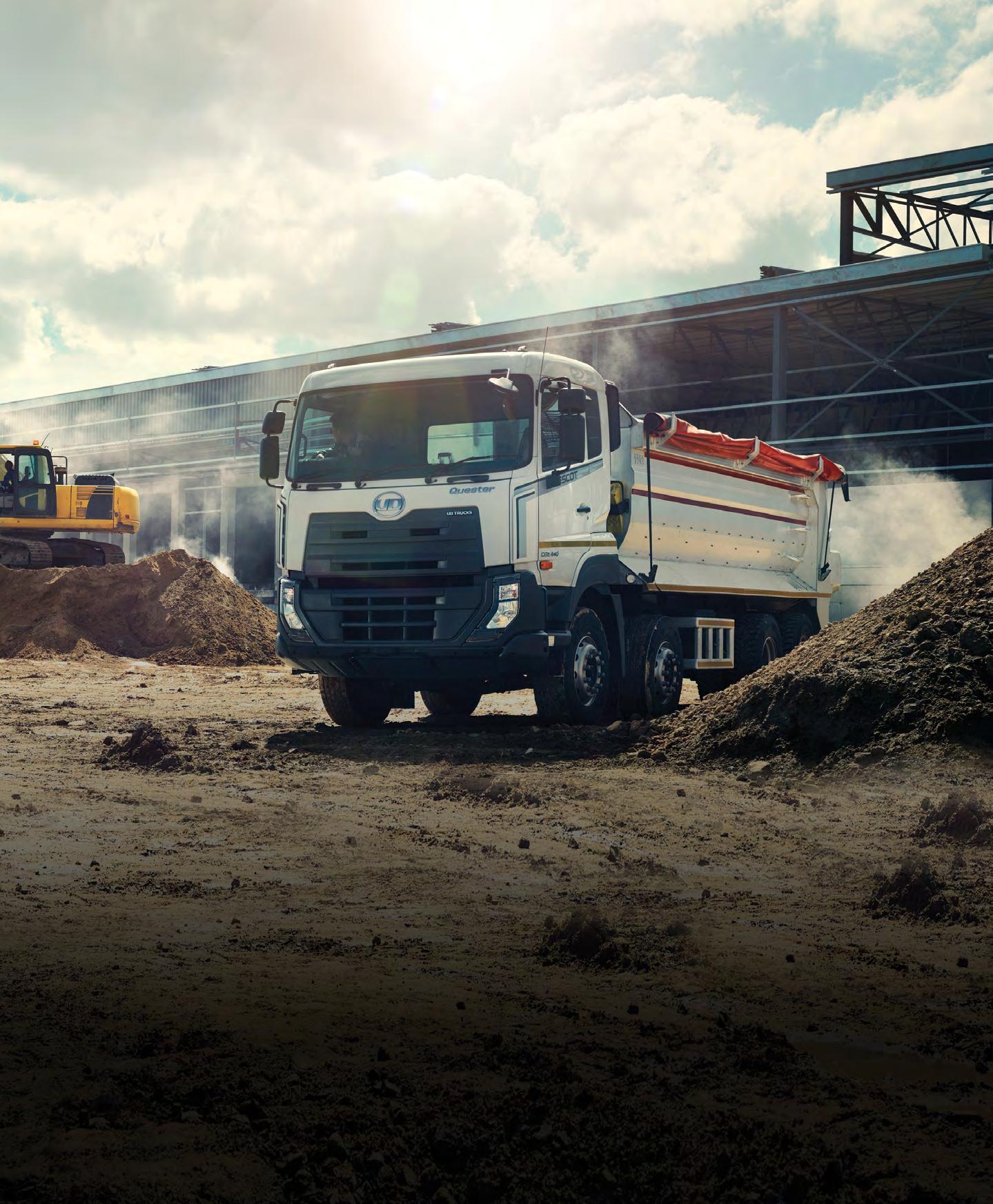



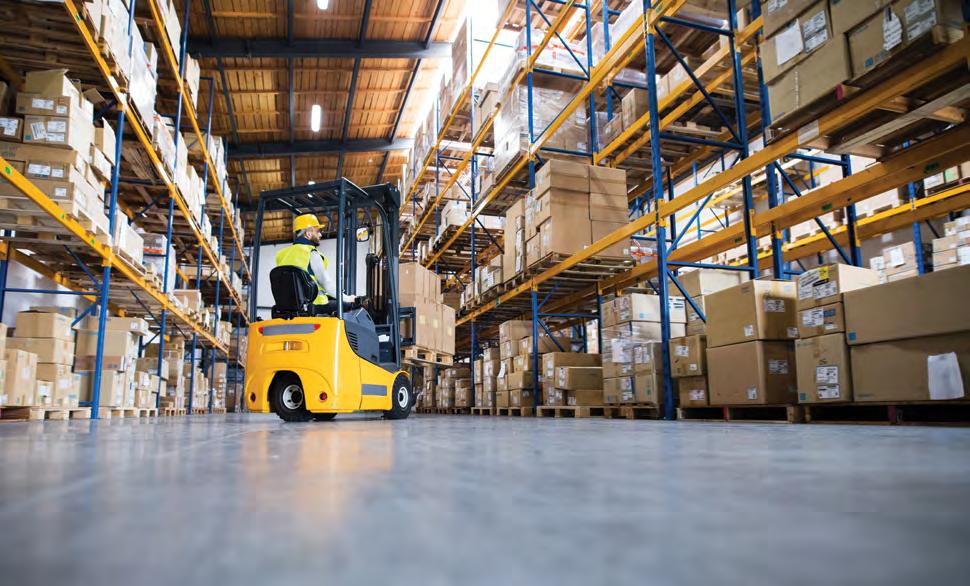
Emirates Post has opened a 33,475 sqft centre at the dedicated eCommerce free zone EZDubai in Dubai South’s Logistics District that will handle parcels and express, domestic, and international volumes.
This is the company’s second largest sorting and delivery centre in the UAE. The new facility is expected to handle over 25% of total P&E business volumes over the next three years.
EZDubai has all it takes to support the launch of Emirates Post’s new facility by providing its customers in the neighbouring areas with their international and domestic shipping requirements.
The new facility at EZDubai strengthens Emirates Post’s position as a major player in the eCommerce market with enhanced first-mile, last-mile, warehousing, and fulfilment capabilities. The centre will also house a dedicated customs’ clearance team to support the movement of deliveries from the free zone to the local market and rest of the world. In his comments, Mohsen Ahmad, CEO of the Logistics District at Dubai South, said: “At EZDubai, we are always on the lookout to attract the top local and interna-
tional players in the industry. We are pleased to welcome Emirates Post, and this facility will support the handling and processing of their volumes arriving and departing via DWC and Jebel Ali, along with the development of its road transport network around the region in the years to come.
“Having the bonded and non-bonded warehouse facilities at Dubai South helps us cater to customers’ demands with our mandate to attract international and local logistics and eCommerce players, boosting the growth of the logistics sector in general.”
Peter Somers, CEO of Emirates Post said: “The opening of our new facility supports our business transformation plan to further enhance service levels and customer experience, grow our parcels and express business, and invest in automation and digitalisation to provide the best first- and last-mile solutions in the UAE.
“As customer happiness is the core of our strategy, this facility will allow us to offer a more tailored experience to our customers, serving our business and individual customers in a more efficient manner with faster deliveries and more flexible pick-up and dropoff times.”
Mohammed bin Rashid Aerospace Hub at Dubai South announced that private jets movements continued their impressive growth in 2021 with a 336% increase in Q1 2021, reaching 4,904 compared to 1,460 in Q1 2020 and 1,676 in Q1 2019.
Aircraft movements include the four FBOs operating at MBRAH, which are Jetex Executive Aviation, Jet Aviation, DC Aviation and ExecuJet Middle East. Tahnoon Saif, CEO of Mo-
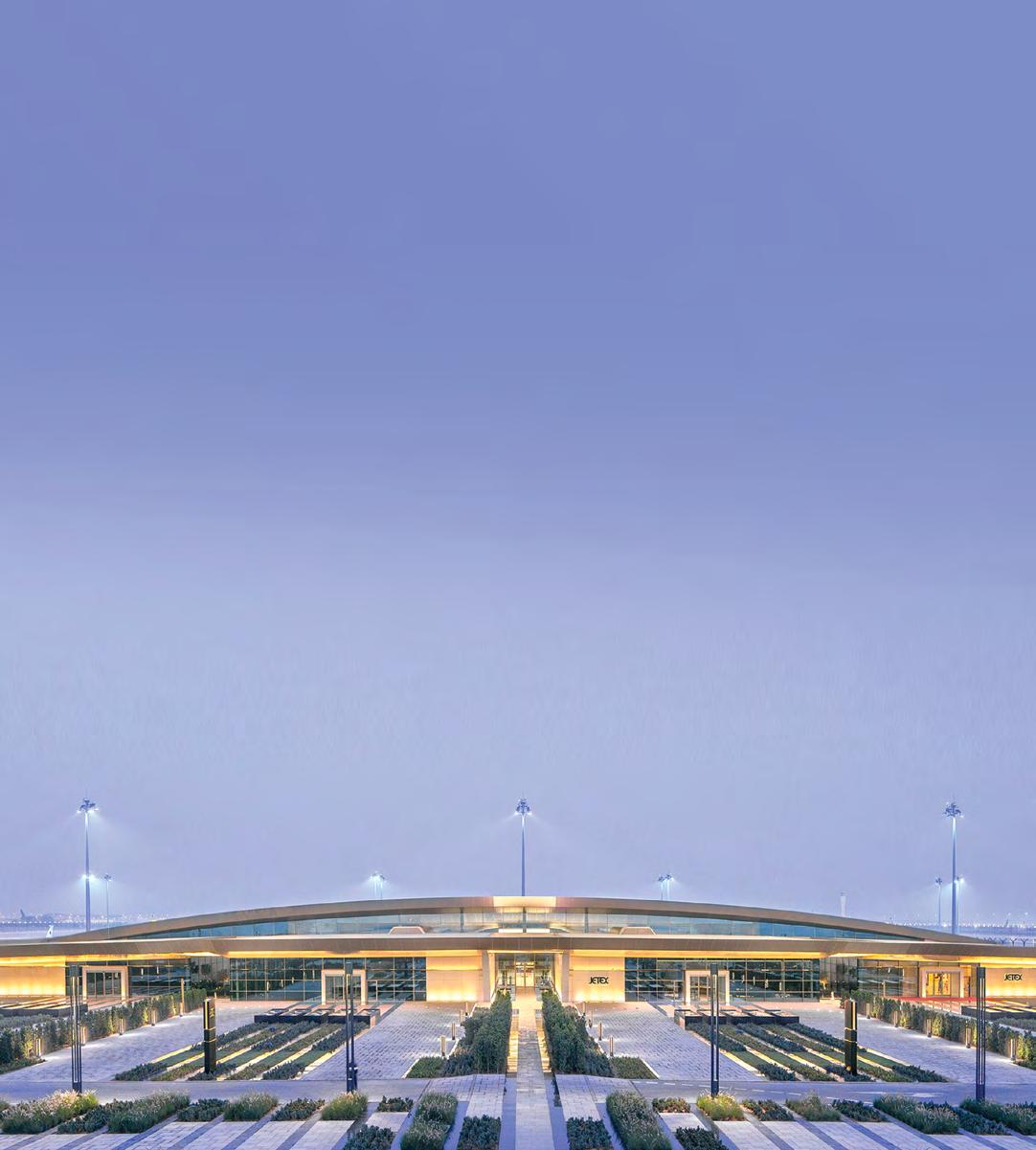
hammed Bin Rashid Aerospace Hub, said: “Our private jets movements at the VIP Terminal in MBRAH have been increasing steadily since last July, which is a testament to the successful national vaccination campaign.
“The emirate’s status as a preferred destination for tourists from across the world as well as Dubai’s ranking third globally and second in the ‘Major Cities’ category in the recent ‘FDI Global Cities of the Future 2021/2022’ report as a magnet for foreign direct investment (FDI). “We look forward to
sustaining the momentum of aircraft movements as Dubai gears up to welcoming the world to Expo 2020 in October.”
MBRAH offers global aerospace players high-level connectivity and is a free-zone destination for the world’s leading private jet companies and associated industries. Located in and developed by Dubai South, MBRAH is also home to maintenance centres as well as to training and education campuses and seeks to strengthen engineering industries.
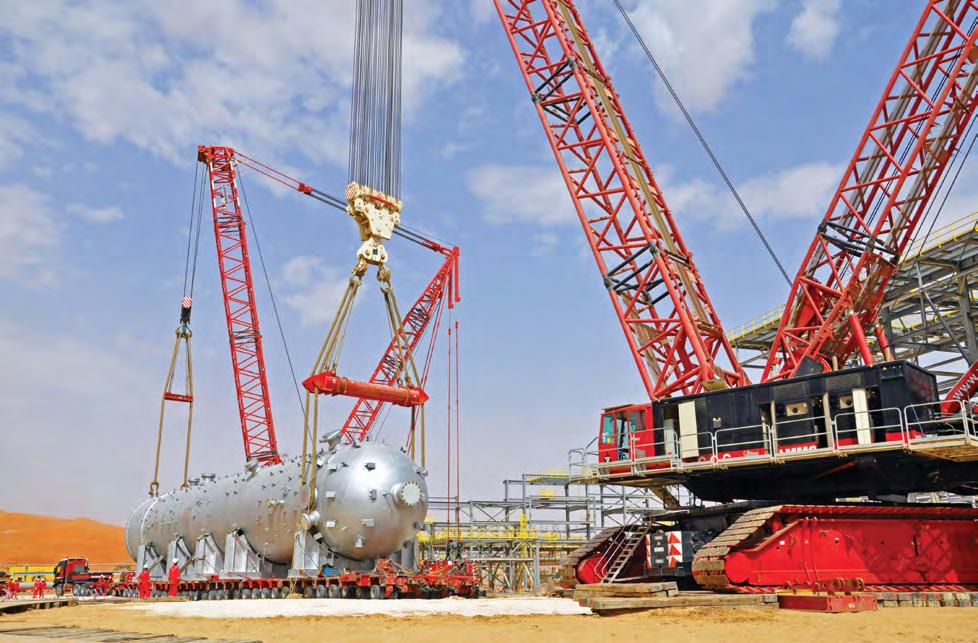
South Korean oil and gas company Samsung Engineering has awarded Mammoet’s Saudi branch the transport and installation scope of the Aramco Hawiyah Unayzah Gas Reservoir Storage (HUGRS) project.
Samsung Engineering was appointed the main engineering, procurement, and construction (EPC) contract for Aramco HUGRS in January 2020.
The Aramco HUGRS project is located 260km east of Saudi Arabia’s capital Riyadh. The plant comprises a gas injection facility with a capacity of 1,500 million standard cubic feet per day (mmscfd) as well as a withdrawal facility which is capable of processing up to 2,000 mmscfd of gas. The project includes construction of a gas injection facility with booster and injection compressors, a gas reproduction facility with reproduction compressors and slug catchers, as well as various utilities and offsite facilities.
Over 60 components will be received either at King Fahad Industrial Port in Jubail or at a fabrication facility in Dammam and transported to the site for further installa-
tion. The heaviest components include four slug catchers, each weighing more than 400t. Mammoet’s scope includes associated port handling and customs clearance activities, obtaining of required permits from the Royal Commission and the Ministry of Transport, along with a close collaboration with Saudi Traffic Police to smoothly facilitate the project’s transport phase. Over 200 lifts are expected to take place throughout the 17-month long project.
Kevin O’Sullivan, General Manager Mammoet Saudi Arabia commented: “This contract award follows on from the successful delivery of other projects for Samsung Engineering in Saudi Arabia, such as the Shaybah petrochemical plant construction project and Jubail United Petrochemical Company’s EO/EG plant. It was secured primarily on the back of the client’s confidence in Mammoet’s technical expertise, quality and safety standards and we are confident in the success of this project.”
The facility is expected to be completed in 2023 and will enable Saudi Aramco to efficiently manage surplus gas volumes to meet seasonal demand.
The International Air Transport Association (IATA) released March 2021 data for global air cargo markets showing that air cargo demand continued to outperform pre-COVID levels (March 2019) with demand up 4.4%.
The demand in March reached the highest level recorded since the series began in 1990. Month-onmonth demand also increased albeit at a slower pace than the previous month with volumes up 0.4% in March over February 2021 levels.
Global demand, measured in cargo tonne-kilometres (CTKs), was up 4.4% compared to March 2019 and 0.4% compared to February 2021. This was a slower rate of growth than the previous month, which saw demand increase 9.2% compared to February 2019.
A weaker performance by AsiaPacific and African carriers compared to February contributed to softer growth in March.
Global capacity, measured in available cargo tonne-kilometres (ACTKs), continued to recover in March, up 5.6% compared to the previous month. Despite this, capacity remans 11.7% below preCOVID-19 levels (March 2019) due to the ongoing grounding of passenger aircraft.
Airlines continue to use dedicated freighters to plug the lack of available belly-capacity. International capacity from dedicated freighters rose 20.6% in March 2021 compared to the same month in 2019 and belly-cargo capacity of passenger aircraft dropped by 38.4%.
Demand for exports grew broadly in March. This was concentrated in developed countries during January and February. Delivery times for manufactured goods are increasing which normally indicates increased demand for air cargo in efforts to reduce shipping time.
Global trade rose 0.3% in February – the ninth consecutive monthly increase and the longest continuous growth in more than two decades.
“Air cargo continues to be the bright spot for aviation. Demand reached an all-time high in March, up 4.4% compared to pre-COVID levels (March 2019). And airlines are taking all measures to find the needed capacity. The crisis has shown that air cargo can meet fundamental challenges by adopting innovations quickly. That is how it is meeting growing demand even as much of the passenger fleet remains grounded. The sector needs to retain this momentum post-crisis to drive the sector’s long-term efficiency with digitalisation,” said Willie Walsh, IATA’s Director General.
Asia-Pacific airlines saw demand for international air cargo drop 0.3% in March 2021 compared to the same month in 2019. The slight weakness in performance compared
to the previous month was seen on most of the trade lanes connected with Asia. International capacity remained constrained in the region, down 20.7% versus March 2019. The region’s airlines reported the highest international load factor at 78.4%.
Middle Eastern carriers posted a 9.2% rise in international cargo volumes in March 2021 versus March 2019. Month-on-month, Middle East carriers posted the strongest growth of all regions, up 4.4%.
Of the region’s key international routes, Middle East-North America and Middle East-Asia have provided the most significant support, rising 28% and 17% respectively in March compared to March 2019. International capacity in March was down 12.4% compared to the same month in 2019.
African airlines’ cargo demand in March increased 24.6% compared to the same month in 2019, the strongest of all regions. Robust expansion on the Asia-Africa trade lanes contributed to the strong growth. March international capacity decreased by 2.1% compared to March 2019.
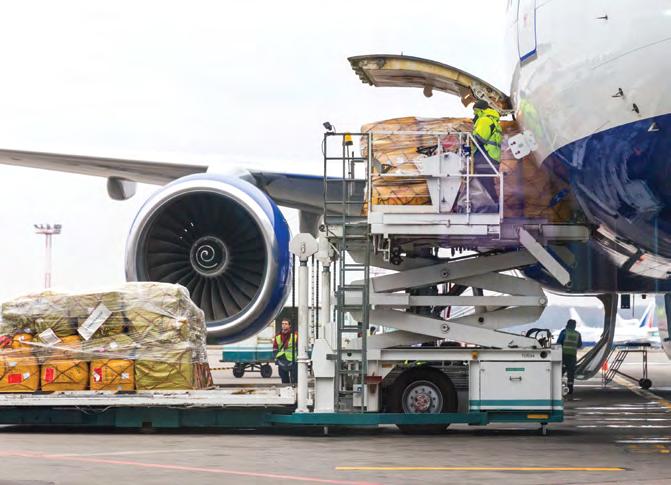
In line with ‘Make it in the Emirates’ strategy, Etihad Rail has sought to manufacture sleepers locally, as part of its plan to use many of the main components required for building the network from within the UAE.
Sleepers are a vital component of the railway network, as they form the horizontal base for anchoring railway tracks, WAM reports.
The company has built factories to manufacture railway sleepers locally, rather than importing them with the aim of achieving optimal efficiency in time, effort, and costs, alongside reducing the environmental impact of importing goods into the UAE.
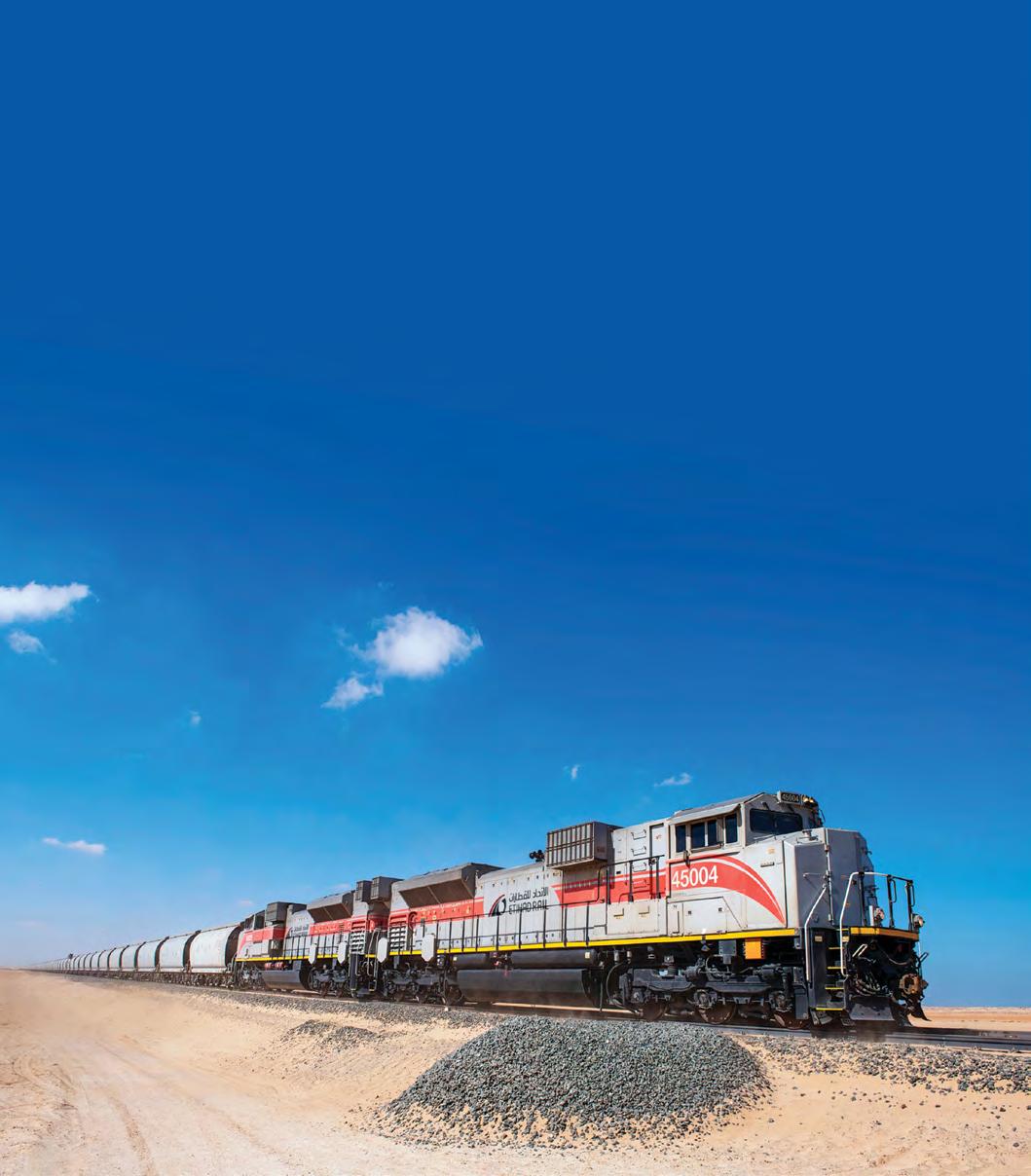
The highest quality of raw materials that are available locally, are used in manufacturing the sleeper, which contributes to creating hundreds of jobs across the UAE.
One of the two sleeper factories is in Al Mirfa of Al Dhafra region of Abu Dhabi. The factory spans over 13,000 sqm, and can produce 45,000 sleepers each month, manufacturing all sleepers required for Stage One of the project.
The second factory, located in Saih Shuaib on the border between Abu Dhabi and Dubai, covers an area of over 9,000 sqm. Having taken 12 months to build and requiring
700,000-man hours, the factory can produce 1.1 million sleepers.
The production of sleepers at the factories is conducted over a production line facility. With eight lines in operation, each line can produce 400 sleepers per day, with the factory producing 3,200 sleepers in every casting.
Each sleeper produced at the factory undergoes a thorough quality and inspection test. These tests include dimensional tests, cube testing, and bending testing. Assessors check for any cracks before the sleepers are transported to the assembly area to be used.
American manufacturer of temperature control vehicles Thermo King has supplied the online grocery store Kibsons International with 80 new vans refrigerated with V-300 units.
The new refrigerated vehicles will operate across Kibson’s multiple sales points, cold store facilities and meat processing plant, expanding the reach of the company’s home delivery operations across the entire country.
The V-Series refrigeration units from Thermo King feature tight temperature control even with multiple delivery
drops, easy to use driver interfaces and low noise, low emission operation as demanded in urban operations.
The units are powered by a road compressor and an electric power supply, offering high performance, efficient and reliable operations to protect the perishable goods during transport.
“Our ambition at Kibsons is to be the leader in the rapidly growing grocery home delivery sector in the UAE. By expanding our fleet, we can now quickly reach our customers anywhere in the country,” said Husainy Sharbat, finance and operations
manager at Kibsons. “We partnered with Refrigerated Transport System, an authorised dealer of Thermo King in the UAE to fit our vehicles with the best refrigeration technology and ensure that our products reach the customers in the best possible condition. Fleet utilisation is also crucial for our business, and Thermo King and its dealer network provide us with service and support whenever and wherever we need ensuring the highest uptime.”
“The accelerated growth of the online grocery shopping increased the demand for last-mile delivery fleets specified to transport the widening range of fresh and frozen products,” said Walid Sellami, area manager at Thermo King UAE.
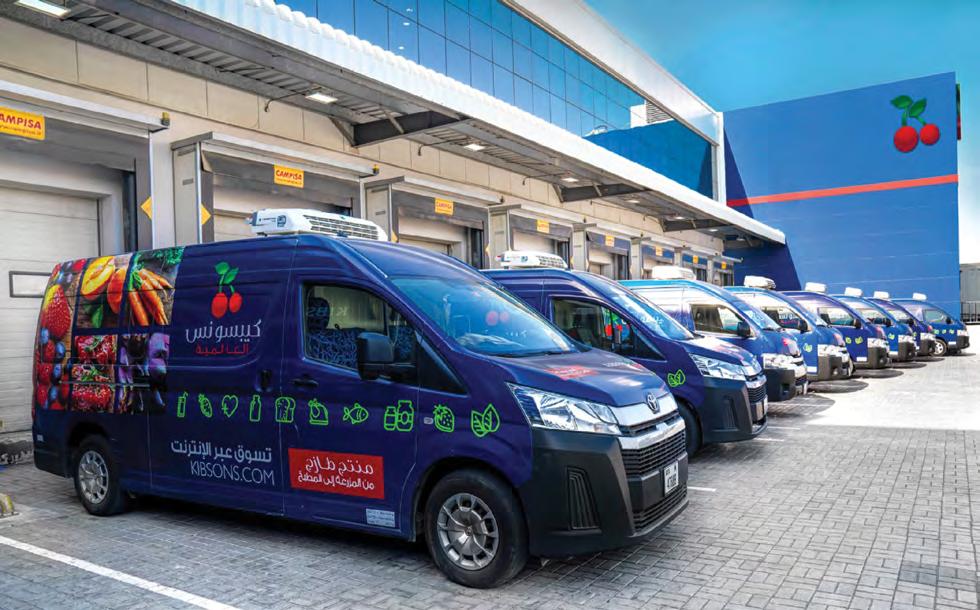
reveals how she’s bringing high-quality, premium, and sustainable baby clothing to the region
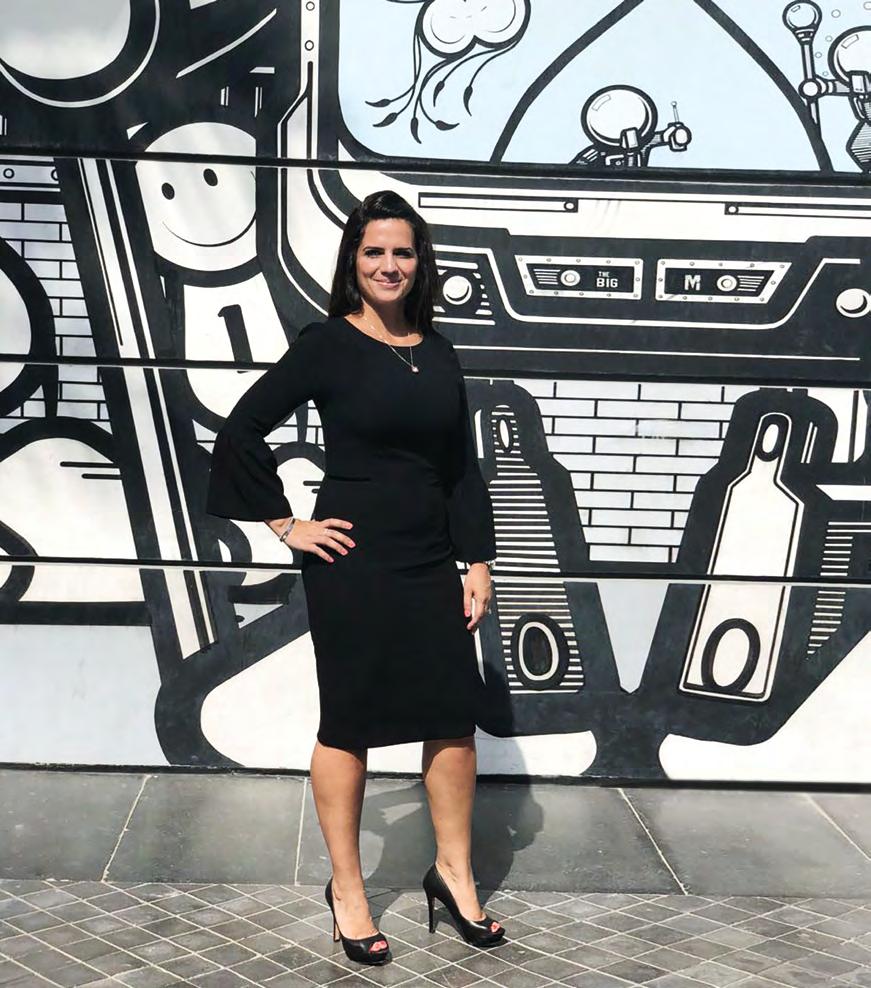
Entrepreneurship has been in my blood. It runs in my family – my dad and brothers have been in business for a long time. While growing up I’d watch them discuss it at the dining table and then during my teen years I helped them after school,” Elli tells us as we delve into how she began her eCommerce business.
Elli grew up in Sweden and worked in the banking sector as a corporate financial adviser for ten years before making the switch to running her own business. Elli’s brand Elli Junior focuses on bringing top quality, sustainable baby and toddler products to the region.
Woman with a vision
Elli says: “Our vision is to be the first brand across the GCC parents consider when they wish to purchase sustainably designed premium clothing and products for their children. Our aim is to keep it as affordable as possible. We want more mums and dads to be able to give the best to their kids.”
With this idea, Elli started Elli Junior when she relocated to Dubai in 2017. “When my husband and I decided to move to Dubai, I saw my chance to start something fresh while being able to spend time with my two girls, since there weren’t any flexible jobs. I looked in to starting up something on my own, in a new country, with no knowledge about the local market, no support, no guidance, I did it all on my own from day one. I noticed the lack of nice premium baby products in the market, and Sweden has some amazing brands that was not available here.
“I believed in myself and saw a potential in the market. I learn something new every day. It’s been a crazy journey, but I wouldn’t change a thing.”
Starting from scratch
Armed with just work experience from her family business and her corporate job, Elli launched her company. “I contacted my favourite Swedish brands and got the exclusivity for GCC, and begun distribution of just one brand, it took time and grew slowly. Today, I am a distributor of four big brands and have developed my own label. Without any knowledge of the industry and market and in less than three
years, we are in 20 stores across UAE.”
Elli Junior is the official distributor of Elodie Details, Kids Concept, Miniland, Bloomingville and JaBaDaBaDo. In January 2020, Elli launched her own collection of high-quality organic baby towels, play mats, bamboo blankets with more products in the pipeline.
“I’m focusing on my own eCommerce platform since distribution only works with high volumes and it’s not easy to export. eCommerce has become my saviour, especially since the advent of COVID-19. Now, we have some of the best brands from Sweden and are adding a few more with a prime focus on quality and sustainability. I want to be the biggest mother and baby child platform in the GCC.”
Hurdles and challenges
The journey hasn’t been easy for Elli and her team, especially being a female entrepreneur with no previous experience in the industry. “Many people did not believe in me and my business idea. They did not see how this could scale and be successful. I had to prove myself to them and I’ve always proved them wrong. Our turnover doubles every year, and we are now finishing our fourth year. We have been profitable from day one.”
She adds: “I wish that I had a mentor when I started. I learned as I faced difficulties, most being logistics issues, no
one really explained what the best or most efficient way was to move goods and to be profitable. I still have my first shipping invoices saved, where I paid 100% over the actual shipping cost. It cost me more than my value of goods.”
Logistics is still the biggest challenge for the Elli Junior team. “Find the right logistic partner while I’m still a small business is a real task. I need someone that can understand my business and be a support even when the volume is low,” she notes.
“I need a partner that believes in me, will grow with me and gives me decent rates to be able to scale in the region. Once this is solved, we will be able to grow and deliver goods across the GCC quicker and at an affordable price.”
She hopes to see more support for start ups in the region and better international shipping rates for the GCC. Going forward, Elli hopes her platform becomes the number one premium store for parents and kids.
“OUR VISION IS TO BE THE FIRST BRAND ACROSS THE GCC PARENTS CONSIDER WHEN THEY WISH TO PURCHASE SUSTAINABLY DESIGNED PREMIUM CLOTHING AND PRODUCTS FOR THEIR CHILDREN.”
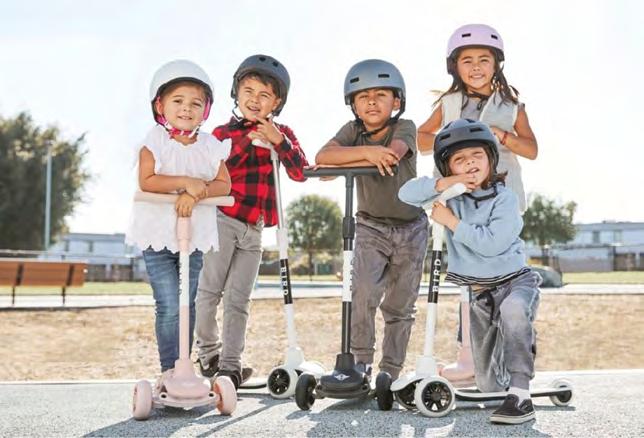
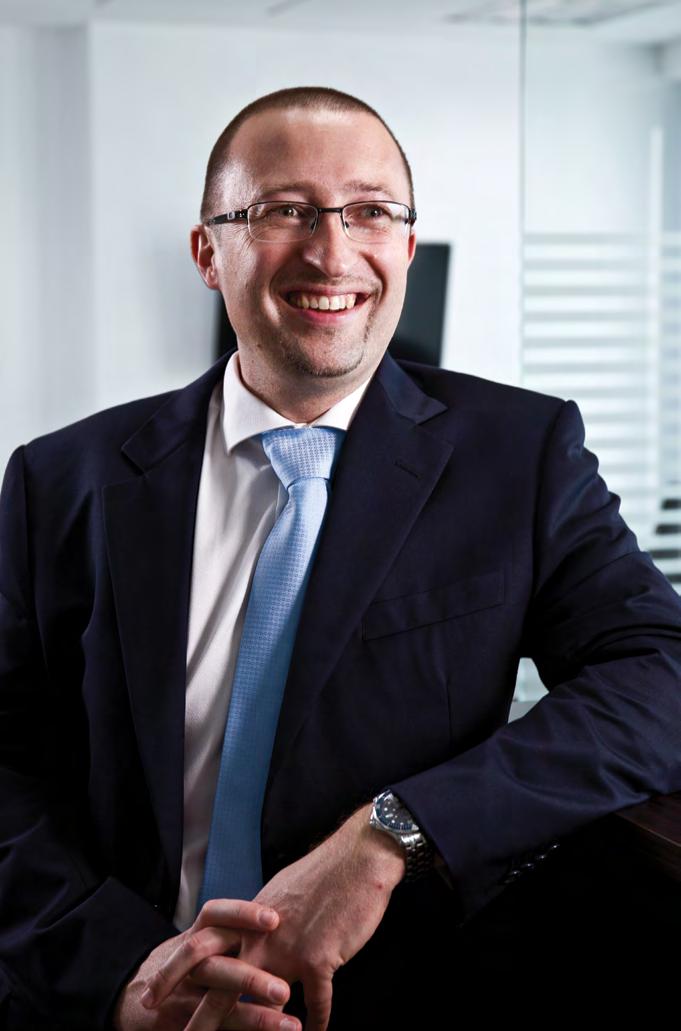
SAVOYE RECENTLY ANNOUNCED PLANS TO EXPAND IN THE MIDDLE EAST. MANAGING DIRECTOR FREDERIC ZIELINSKI TELLS US HOW AND WHY THEY WISH TO FORAY INTO THIS MARKET
Due to its strategic geographical location, Dubai has become a trading and logistics hub attracting the biggest players in the market. Seeing a demand for supply chain technology in the region, French logistics solution engineering company Savoye saw an opportunity to bolster its business and provide pioneering technology to supply chain companies in the region.
Frederic Zielinski, EMEA Managing Director, Savoye, reveals why UAE was on its radar: “The country has an advanced logistics network that serves the national efforts to boost industrial development. This is well-outlined in its UAE Industrial Strategy. We believe that the country has strong potentials to further advance its logistics industry through innovation and technology and our range of solutions can contribute and help facilitate these ambitions.”
Apart from the UAE, Savoye hopes to set a footprint in Saudi Arabia too. “Like the UAE, particularly Dubai, the Saudi government has also been working towards reducing its heavy reliance on fossil fuels, modernising, and industrialising the Kingdom, and taking key steps to becoming a world-class logistics hub in the region. We aim to optimise opportunities arising from all these efforts,” he reveals.
“Our immediate target in the region is to fully establish a complete local team in Dubai before the year ends, to be closer to our customers in our key markets and better serve them on every front, from pre-sales and sales to project management, integration, and after-sales services. We will also strive to achieve significant and fast growth in our covered sectors, including food, eCommerce, and pharmaceuticals.”
The company is seeking to tap opportunities in high-potential vertical industries such as retail, trade, and distribution. He adds: “Specifically local and foreign retailers with their own shops, shopping centres and eCommerce players; third-party (3PL) logistics; food, including wholesalers, supermarket chains and companies with cold storage needs; and pharmaceuticals and medical goods, particularly wholesalers and distributors. We can serve these sectors well by providing our specific and well-engineered solutions.”
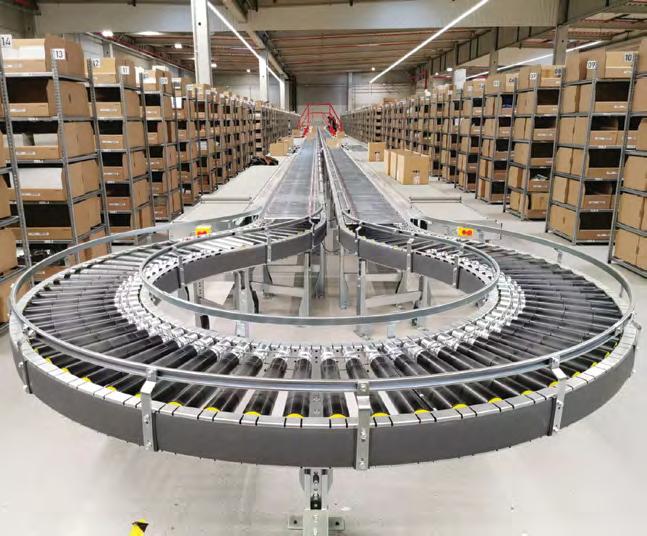
So what does Savoye do? It is a manufacturer of manual, semi-mechanised, mechanised, highly automated, and robotic installations, as well as high-tech equipment and warehouse management solutions that employ the latest digital technologies.
Frederic says: “In today’s modern age, it is important to integrate the latest technologies into the industry to best address the advanced logistics needs of the clients, promote high operational efficiency, and achieve sustainability. Airports are among the first to roll out the next-generation technologies such as artificial intelligence (AI) and robotics, with other sectors following suit.
“More recently, the same tools have been deployed in the supply chain on the manufacturing side to modernise the system, but this is not yet mainstream in logistics. In fact, warehouse automation is new to this region, and we feel that Savoye has a role to play in promoting its increased adoption and deployment. We passionately believe that now is the right time to automate logistics services to stay relevant amid rapid technological innovations.”
He also believes that technology can help the logistics sector reduce its impact on the environment. “There are many ways the logistics sector can integrate sustainability and significantly contribute to reducing the carbon dioxide emissions and address climate change,” he says.
The shift to clean and renewable energy as power sources are making a huge difference in lessening the industry’s environmental impact.
He adds: “Technologies are widely available now especially for wind and solar power and logistics companies can choose to integrate these in their operations. The use of hybrid or fully electric vehicles within the sector can also cut on air pollution. Sustainable waste management is also one aspect where logistics companies can be sustainable with the implementation of the 4R strategy – reduce, reuse, recycle, and recover.”
According to Frederic, Savoye implements packing optimisation methods, amid rapid increase in eCommerce activities, to help customers meet their sustainability goals.
“We provide a packing machine range designed to automate processes with minimal environmental impact. Specifically, we offer Jivaro and e-Jivaro closing machines to help companies meet their environmental sustainability targets,” he notes.
“Furthermore, businesses can leverage our robotics goods-to-person X-PTS system to improve their warehouse space utilisation. Through this system, companies can efficiently use all available vertical space of their warehouse instead of the surface.”
“IN TODAY’S MODERN AGE, IT IS IMPORTANT TO INTEGRATE THE LATEST TECHNOLOGIES INTO THE INDUSTRY TO BEST ADDRESS THE ADVANCED LOGISTICS NEEDS OF THE CLIENTS, PROMOTE HIGH OPERATIONAL EFFICIENCY, AND ACHIEVE SUSTAINABILITY.”
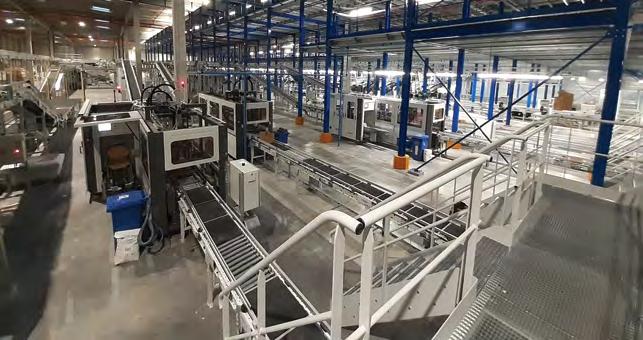
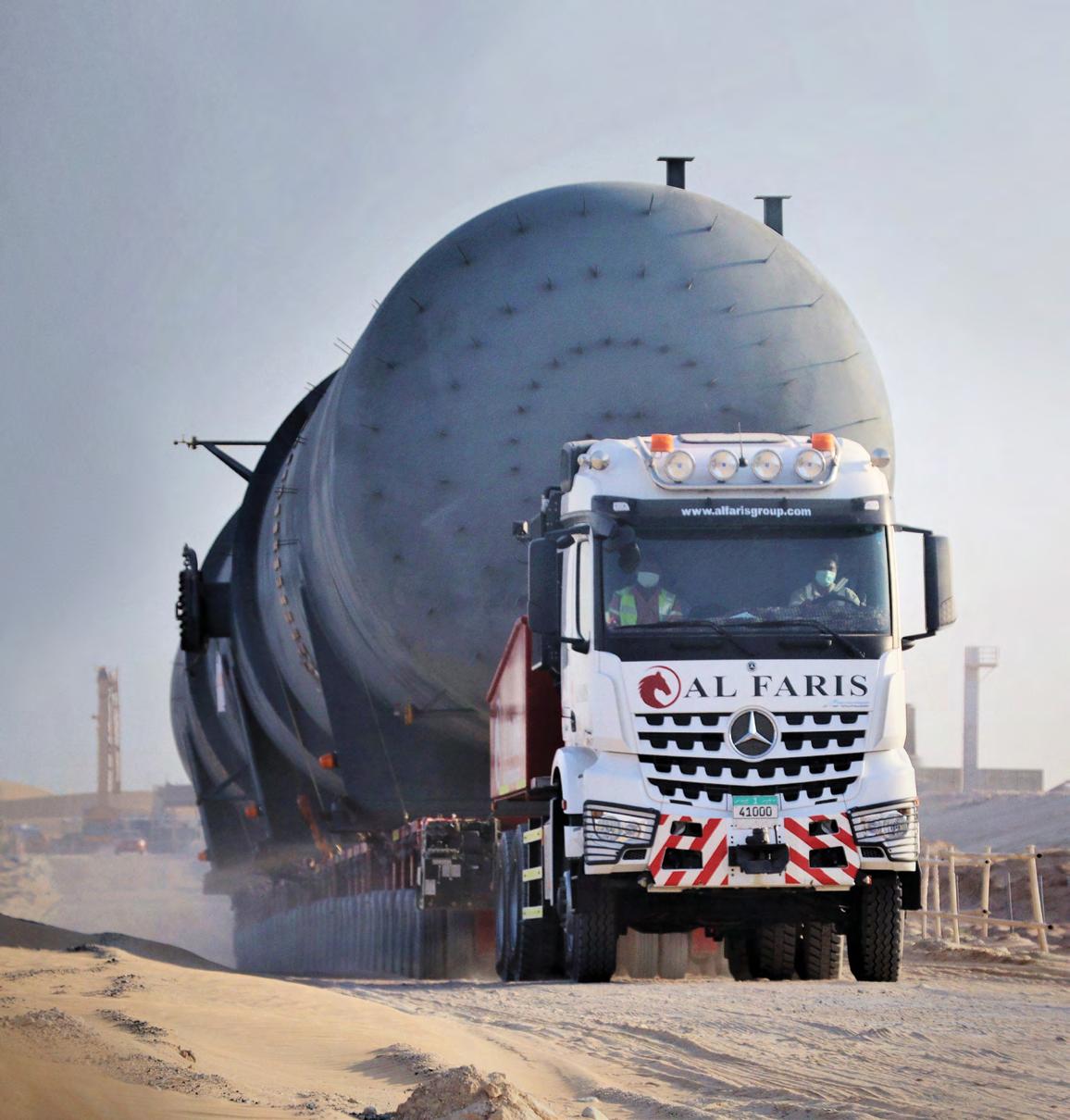
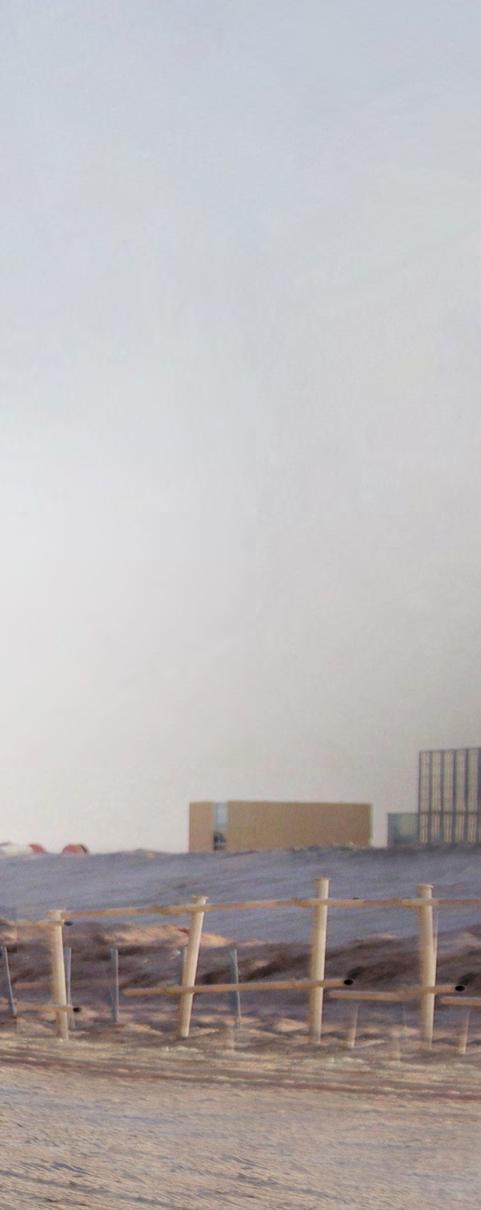
Al Faris Group recently took delivery of two Mercedes-Benz Arocs 4058 AS 6x6 SLT vehicles from Emirates Motor Company - we find out what makes these robust heavy-duty tractor units valuable assets
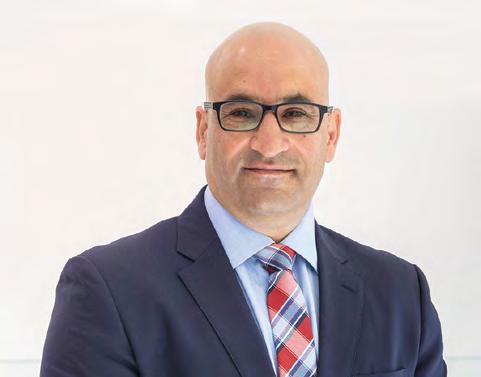
Driven by Mercedes-Benz Trucks’ most powerful engine: the six-cylinder in-line OM 473 engine with 15.6 l displacement with an output of 578 hp (425 kW), offering torque of 2,800 Nm in Euro 5 emission norm, the Arocs SLT is a force to be reckoned with. Precisely what heavy lifting, heavy transport and energy solutions company Al Faris Group was looking for. Kieve Pinto, Executive Director of Al Faris Group says: “We have performed numerous heavy transport operations for abnormally sized objects for more than 28 years and it has always been our priority to provide safe, innovative, and reliable solutions for heavy lifting, heavy transport and energy projects.
“When it comes to heavy transportation, the Arocs SLT meets the demands and our high standards. The addition of these two new trucks will add value to the company and we look forward to our long-term partnership with Emirates Motor Company.”
“Heavy duty transportation requires high-tech equipment and uncompromising reliability, and this is quite what the Arocs SLT delivers. We thank Al Faris Group for their confidence in us. We are committed to providing long-term support to Al Faris Group and to contributing to their business growth.”
Emirates Motor Company, the authorised general distributor for Mercedes-Benz in Abu Dhabi, delivered the two Arocs SLTs to Al Faris in April. Bilal Al Ribi, General Manager Commercial Vehicles of Emirates Motor Company, notes: “Heavy duty transportation requires hightech equipment and uncompromising reliability, and this is quite what the Arocs SLT delivers. We thank Al Faris Group for their confidence in us. We are committed to providing long-term support to Al Faris Group and to contributing to their business growth.”
Designed to cope with the highest levels of stress and strain, the Mercedes-Benz Arocs SLT is an extremely robust heavy duty tractor unit with a permissible gross combination weight of up to 250 tonnes.
Olaf Petersen, General Manager Daimler Trucks Sales, Daimler Commercial Vehicles MENA, says: “Mercedes-Benz Customer Tailored Trucks (CTT) in Molsheim produces highly
specialised trucks tailored to customers’ individual requirements. Converted at a hand-finishing production facility, the Arocs SLT is developed to meet the requirements of highly demanding transport segment and for customers such as Al Faris Group.”
So, who is Al Faris? A leading heavy transportation, heavy lifting, and energy solutions company with the biggest fleet of cranes and other heavy rental equipment in the MENA region, Al Faris is a family-owned company and has been in business for the past 28 years. It operates in 10 regional offices and has a workforce of more than 3,200 dedicated employees. With high-tech heavy equipment, integrated services and best practices in quality, health, safety, and environment management (QHSE), Al Faris provides secure, innovative, and reliable solutions for heavy lifting, heavy transport, and energy projects.
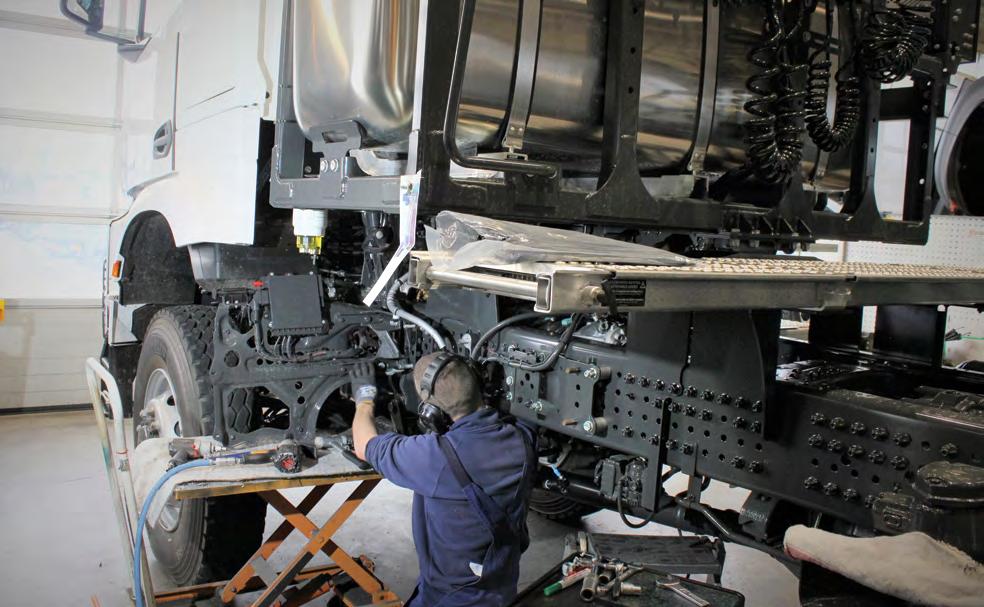
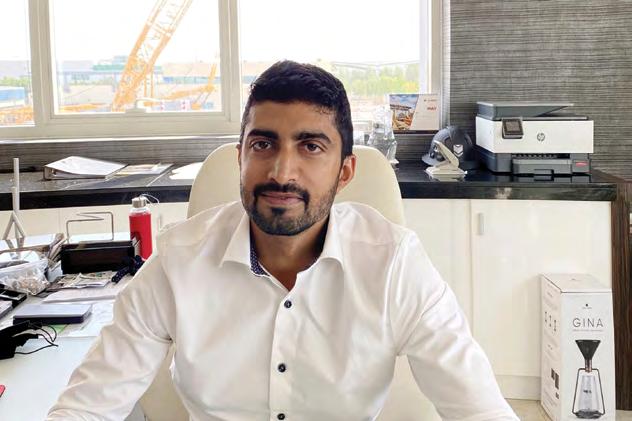
“ We mostly transport heavy, abnormal size loads for the oil and gas industry. The Mercedes-Benz trucks are a perfect fit for our business as they are of good quality and reliable machines.”
“We offer our clients turnkey solutions to today’s heavy lifting and abnormal transport challenges including alternative lifting methods with careful planning and delivery. We mostly transport heavy, abnormal size loads for the oil and gas industry. The Mercedes-Benz trucks are a perfect fit for our business as they are of good quality and reliable machines,” notes Kieve.
Al Faris’ current fleet consists of heavy haulage vehicles that include hydraulic trailers, low beds, flatbeds, and self-propelled modular transporters. He adds: “These are mostly used for heavy transportation purposes for the oil and gas industry as well as for heavy cargo push and pulls.”
Kieve believes that addition of Arocs SLTs to its fleet will offer it versatility and reliability. “At Al Faris we operate in a safe, efficient, and ethical manner, protecting the planet and supporting our green future,” he adds.
Currently, Al Faris is using the Arocs SLT on the solar park overflow tank transportation project, which is part of the ongoing Mohammed Bin Rashid Al Maktoum Solar Park, the largest single-site solar park in the world.
The Arocs SLTs are transporting 10 overflow tanks, each measuring 52m in length, 6m in height and 5.3m in width, and weighing around 200 tonnes. The sheer size of these tanks
has made this an extremely difficult exercise.
Yashvanth Kumar – Group Engineering & Projects Manager, Al Faris Group, explains: “Because of its length and weight, byroad transportation is a challenge. Finding a feasible route from JAFZA to the solar park in Al Qudra to transport the tank was a real task. Our teams worked on a detailed route survey and checked the route for feasibility. Preparation work included getting approvals from RTA for transportation and road modification works, as well as a NOC from the port authorities.”
“After getting the NOCs, we had to start the road modification works before arrival of the cargo. Once the tanks arrived at port, we began to receive all the 10 tanks, and they are currently stored at the port storage yard. We have begun to transport them in convoys of two to the solar park. Approximately 25 people are working in this transportation projects including the engineering and planning teams.”
The length of the tank made the manoeuvring of the trailer quite tricky; however, Yashvanth reveals they are quite satisfied with the performance of the Arocs SLTs. “We are happy with the way it is performing while pulling the heavy loads. It is as powerful as it gets. Exceptionally smooth operation in roundabouts and short turns.”
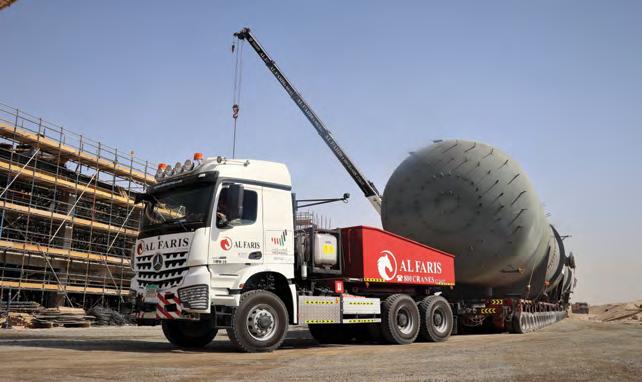
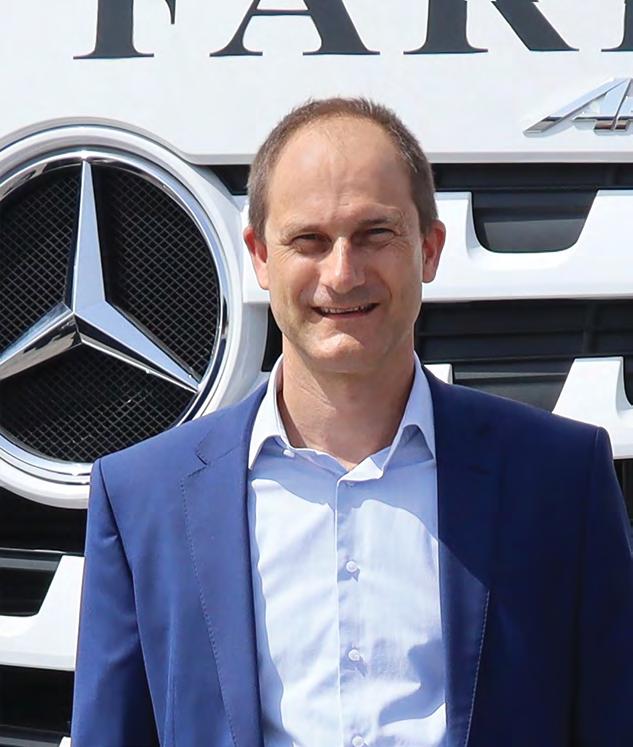
“Fleetboard is much more than a normal tracking system, and being an in-house OEM system, it has access to all data from our CAN BUS, which gives us the competitive edge of offering unique services such as our comprehensive driver performance analysis, service & uptime data.”
An important aspect of this project is how the drivers have managed to drive the trucks with immaculate precision. As transporting abnormal load is a highly challenging task which require precision work, Al Faris stresses on the importance of driver training. Mr. Pinto says: “All our project crew are well trained to international
standards with on-going training for further development and enhancement of skills pertaining to their respective jobs.
“Driver training is of high importance to us. Our extensive training programme, combined with onsite learning, ensures all our professionals perform their tasks with safety as their priority.
“Our engineering and technical departments conduct enhanced training curricula (practical and theory) for our staff including heavy lift, commissioning, and other advanced technical training at regular intervals. The drivers also undergo extensive professional training at our partner (manufacturers and suppliers) training centres on the most efficient use and maintenance of the purchased heavy equipment.”
As a manufacturer, Mercedes-Benz Trucks places a great significance on driver training. Olaf says: “We strongly believe in providing support our customers with professional driver training, whereby the driver is educated about the various systems in our trucks so he can be more relaxed and confident while operating the vehicle, allowing him to manage the systems available in the truck, thus allowing the driver to concentrate on the road and traffic situation, leading to a safer and more economical driving style.
“Driver training plays an important role in reducing total cost of ownership (TCO) of the vehicle, reducing fuel consumption, and leading to lowering CO2 emissions. He adds: “A trained driver is also a safer and more economical driver. The major importance of driver training is to enhance road safety, reduce wear and tear, drive economically and increase vehicle uptime, thus reducing TCO.”
As part of the Arocs SLT handover to Al Faris, 13 drivers were trained to use the vehicle over a period of four days. Olaf adds: “The training consisted of theory, and practical, as we believe drivers learn more by doing rather than seeing. The advanced handover consisted of a seven-point walk-around, whereby the drivers were presented with a detailed explanation of all system outside and inside the trucks.”
Mercedes-Benz Trucks offers driver training as a standard package to all customers, its dealer Emirates Motor Company has a dedicated trainer who provides driver training to all customers who purchase new trucks, as well
as driver training for special operations, such as off-road and construction sites.
Mercedes-Benz Trucks has its own in-house telematics system, Fleetboard, which was developed for its trucks and is used as a driver training tool. Olaf explains: “Fleetboard is much more than a normal tracking system, and being an in-house OEM system, it has access to all data from our CAN BUS, which gives us the competitive edge of offering unique services such as our comprehensive driver performance analysis, service & uptime data.”
He further adds: “Fleetboad can measure if the driver is performing up to the required standards, as
prescribed in the training. A fair grade point system is part of the performance analysis report, which is based on 0-10 points, with 10, being the best.”
“Driver trainers use our advanced Driver Performance Analysis report to identify areas of improvements, and train or advise drivers accordingly. Furthermore, with Fleetboard services of Uptime & Service data, our customers and dealers can work together to schedule maintenance activities, and avoid unnecessary downtime, by remote diagnostics from Fleetboard Uptime service.”
For Mercedes-Benz Trucks, the Arocs SLT is an outstanding proposition on all fronts including its, power-
ful engine, impressive appearance, and the Turbo Retarder Clutch, which is exclusively available on MercedesBenz Trucks, gives the manufacturer an edge over its competitors.
Olaf says: “The Turbo Retarder Clutch is one of the most special features of the Mercedes Benz Arocs SLT. It functions as a wear-free starting-off aid, while the retarder section functions as a brake, and yet is lighter, more efficient, and more compact than a torque converter clutch.”
“This means the SLT tractor unit has temporally unlimited manoeuvrability and unrestricted low-speed driving and crawling capability, meaning that the SLT boasts the greatest possible flexibility in operation.”
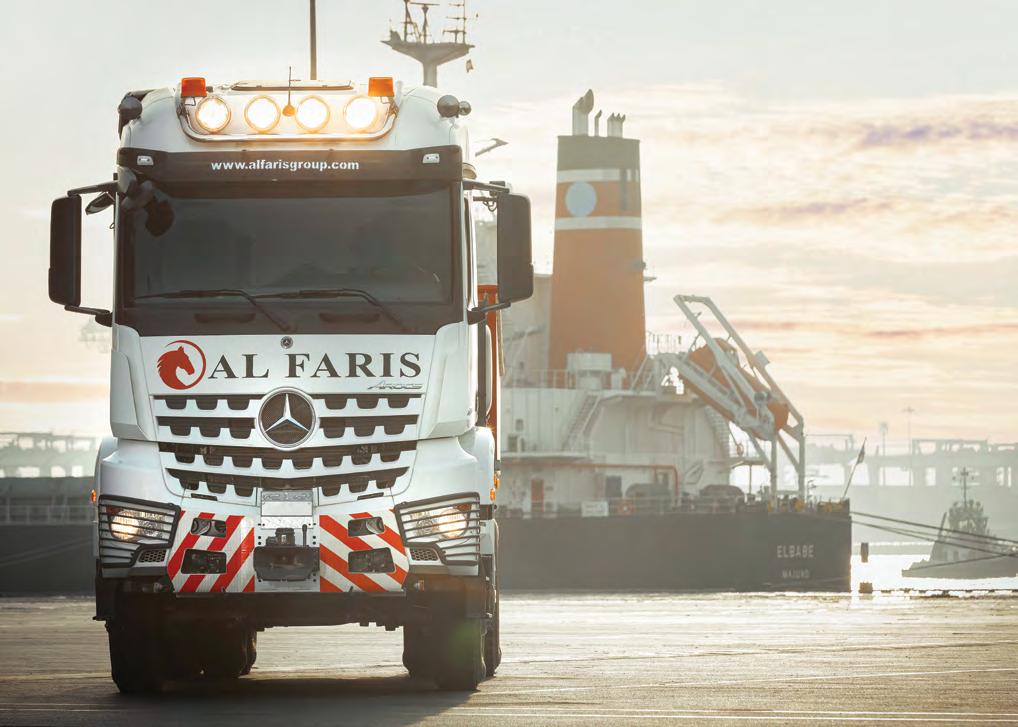
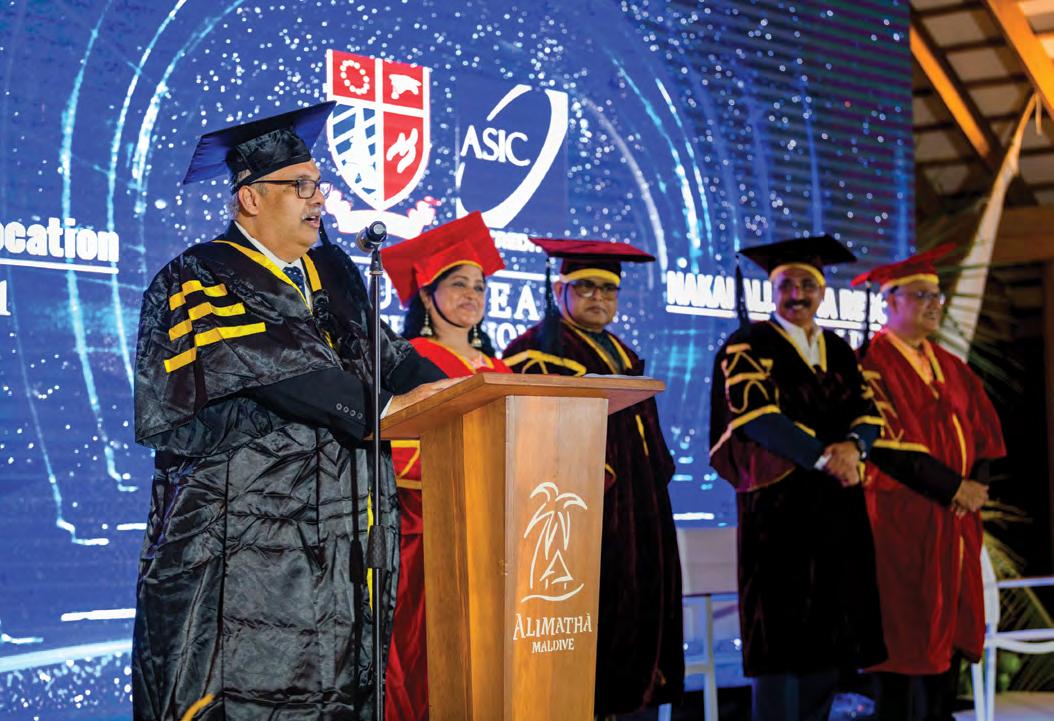
AL FUTTAIM LOGISTICS’ MANAGING DIRECTOR IS TAKING THE COMPANY FROM STRENGTH TO STRENGTH. Here we take a look at what he has achieved.
Dr. Raman Kumar was recently awarded a professional doctorate in Global Business & Leadership by the European International University – Paris. Dr. Raman is the Managing Director of AlFuttaim Logistics which is a leading integrated logistics and supply chain solutions provider in the region, with a global reach of 150 countries through its strategic alliance with global network partners.
Over the past 26 years, he has overseen one million sqm of infrastructure development, gaining a fleet of 600 vehicles, and delivering services to multinational blue-chip companies.
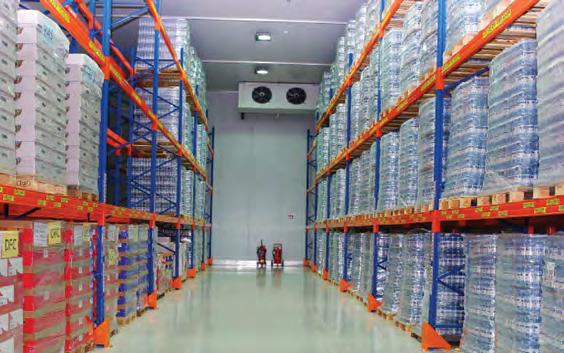
Since Al-Futtaim Logistics inception in 1980, it has grown leaps and bounds and has achieved several milestones. Recently, the company received further accolades due to the introduction of innovative technologies, new service offerings such as the cold store for food & beverages, recovery, pick and drop automotive services and exhibition logistics.
The company is today a diversified logistics service provider, with continued focus on customer centricity and service quality. Dr. Raman has brought a new dimension of customer-focus into the core of the company, embedding it as the basis of all its undertakings.
Al-Futtaim Logistics recently expanded into food and beverage logistics services earlier this year. The announcement came as the company scales up its services to meet the needs of eCommerce and marketplace clients with all-inclusive last-mile home delivery solutions.
Dr. Raman said: “At Al-Futtaim Logistics, we offer integrated F&B solutions, including inbound freight, local services, cold store warehousing, value-added solutions, and temperature-controlled home deliveries for F&B manufacturers and distributors whose ambitions are to expand their footprint in the UAE and across the border.”
To cater to this sector, Al-Futtaim Logistics has acquired 300,000 sqm of warehouses that are strategically located in the UAE, within proximity to cross-border connectivity.
Prior to the worldwide lockdown due to the COVID-19 pandemic, Al-Futtaim Logistics announced its regional expansion plans with operations in Sohar and mainland Oman, providing end-to-end supply chain services from retailers to distributors in diverse sectors.
Despite the COVID-19 pandemic, Al-Futtaim Logistics were able to identify key opportunities for their business to grow.
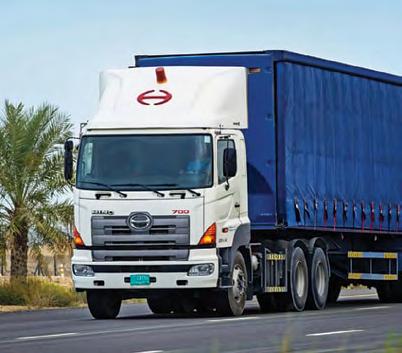
“The pandemic has created a new opportunity – the biggest being technology. We have rolled out a yard management system for vehicles and new tech for contract logistics, fragile transport, and last mile delivery. It has enabled the customer to see the flow of the goods or order throughout the supply chain,” he concluded.
“WE HAVE ROLLED OUT A YARD MANAGEMENT SYSTEM FOR VEHICLES AND NEW TECH FOR CONTRACT LOGISTICS, FRAGILE TRANSPORT, AND LAST MILE DELIVERY.”
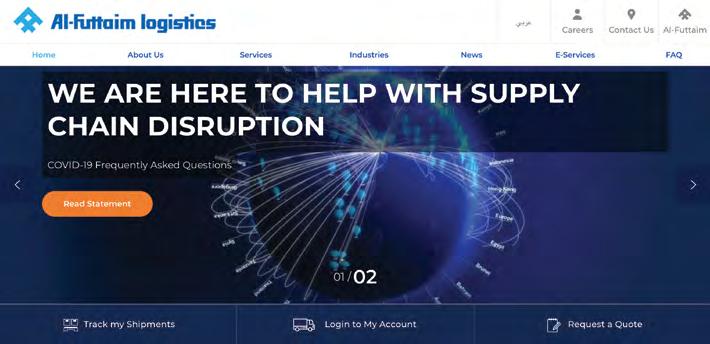
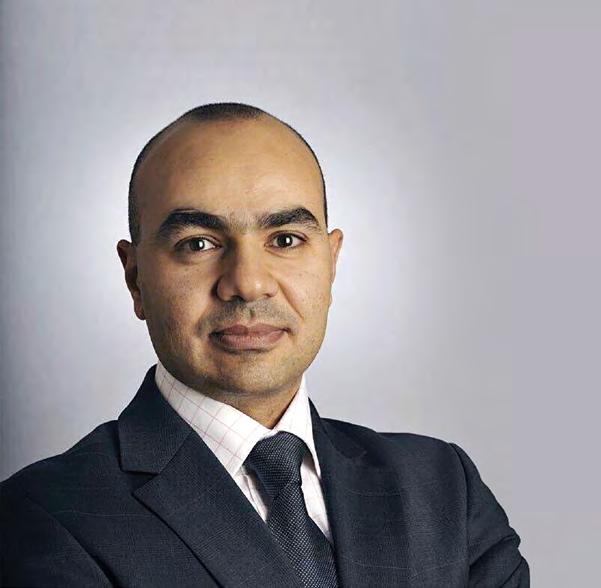
Tamer Salama, Alstom GCC, Managing Director, reveals how excited the team is to build upon its relationship with Dubai Airports with this new five-year O&M agreement
When one thinks of the world’s leading airport, the first thing that comes the mind is usually a plane rather than a train, yet, through our partnership with Dubai Airports, Alstom has consistently proven to be an integral contributor to the mobility ecosystem at Dubai International Airport (DXB).
This vital role that Alstom, a rail transport and sustainable mobility expert, plays in meeting DXB’s transport needs has been reiterated even further by the recent signing of a five-year extension to our contract with Dubai Airports. This means we will continue to provide comprehensive operations and maintenance (O&M) services for the InnoviaTM APM 300 automated people mover (APM) system at DXB.
Alstom’s APM system at DXB has consistently been a top performer,
“WE DESIGNED AND SUPPLIED ALL ELECTRICAL AND MECHANICAL (E&M) ELEMENTS, INCLUDING 18 INNOVIATM 300 CARS (OPERATING AS FIVE-CAR TRAINS) AND THE CITYFLO TM 650 COMMUNICATIONS-BASED TRAIN CONTROL (CBTC) TECHNOLOGY FOR DRIVERLESS OPERATION.”
continuously scoring above the required performance levels. In the first five years of O&M services, the transit system’s average availability scored 99.85% against a 99.5% requirement, with the performance level increasing up to 99.94% in 2020.
Furthermore, almost 4.7 million km of safe vehicle operations and 606,290 safe man-hours were achieved with zero lost time incidents. In addition, the project was declared ‘Top Performer’ among all the contractors at DXB under the Health and Safety Index in 2018.
Alstom acquired Bombardier Transportation on 29 January 2021. Bombardier Transportation delivered the turnkey APM system at DXB to connect Terminal 1 to Concourse D which opened for passenger services in February 2016.
We designed and supplied all electrical and mechanical (E&M) elements, including 18 InnoviaTM 300 cars (operating as five-car trains) and the Cityflo TM 650 communications-based train control (CBTC) technology for driverless operation.
Alstom was the system integrator and led project management, systems engineering, testing, and commissioning, as well as delivering five years of O&M services. The 1.5 km elevated system is designed to carry up to 200,000 passengers daily.
We are a dedicated and long-standing partner of Dubai’s transportation and mobility development. Alstom delivered the Dubai tramway, the first fully integrated tramway system in the Middle East and the world’s first 100% catenary-free line, which was opened in November 2014. We are also in charge of the maintenance of the Dubai Tram for a period of 13 years.
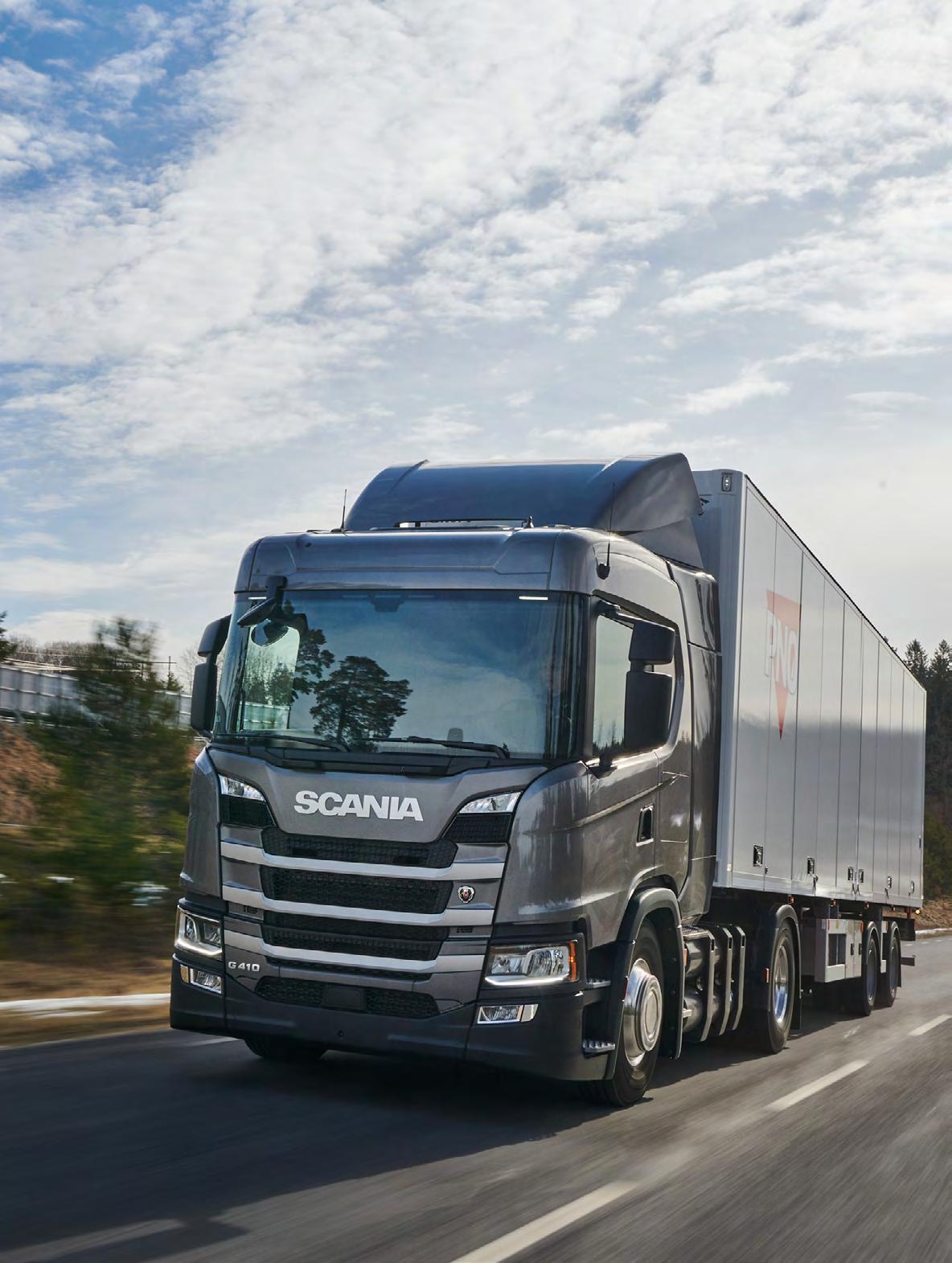

Choosing a gas powered truck will put you and your fleet in the forefront of sustainable truck operations, reduce your CO2 emissions and achieve Euro 6 Emission Legislation without using Adblue or Particulate Matter. Well suited for both urban and regional operations. It can be matched with R, G, L or P cabs and combined with either the Scania Opticruise gearbox or automatic transmissions.
For more information about our Alternative Fuels options, please visit www.scania.com/ae/en/home/products-and-services/articles/alternative-fuels.html
The Founder
& CEO
at Cartlow writes how reverse logistics is essential to eCommerce and a successful circular economy model
When we talk about the ‘reverse logistics’ industry, it involves everything that happens after the sale of a product, including all activities related to their backward movement at any stage of the supply chain.
For many retailers and eCommerce platforms, reverse logistics is considered one of the biggest operational challenges due to the associated volume, cost and skills involved within the process.
It is important to note that there are various programmes that fall under the reverse logistics ecosystem which assist businesses in managing their overstock and returned items as well as help consumers with their unwanted and damaged items; these programmes include managing buyer returns, offering liquidation solutions, enabling buyback or trade-ins and warranty management.
To be able to facilitate these services, an operational process involving sorting (product is processed), grading (product is assessed), refurbishing (product is renewed), repacking (product is repacked), returning to the vendor and recycling, are all required. The products that pass through the process are then resold through a B2B or B2C re-commerce channel to distributors, retailers, or consumers.
The reverse logistics ecosystem is considered an overarching bedrock of a thriving ‘circular economy’ and to enhance such a sustainable ecosystem, it needs to be well integrated into an inventory management system, logistics, after sales services and marketing for an overall smooth flow.
As the demand for products grows, many customers end up with unwanted or damaged items and the average return percentage for eCommerce players in the market continues to grow as a result, in addition, nowadays we are witnessing a huge demand from consumers looking for an easy or hassle-free return policy, where businesses will
struggle to retain their customers if such conveniences are not provided. Moreover, through its wide variety of options, reverse logistics contributes to improved customer retention level, lower capital expenditure, reduced storage, and delivery costs.
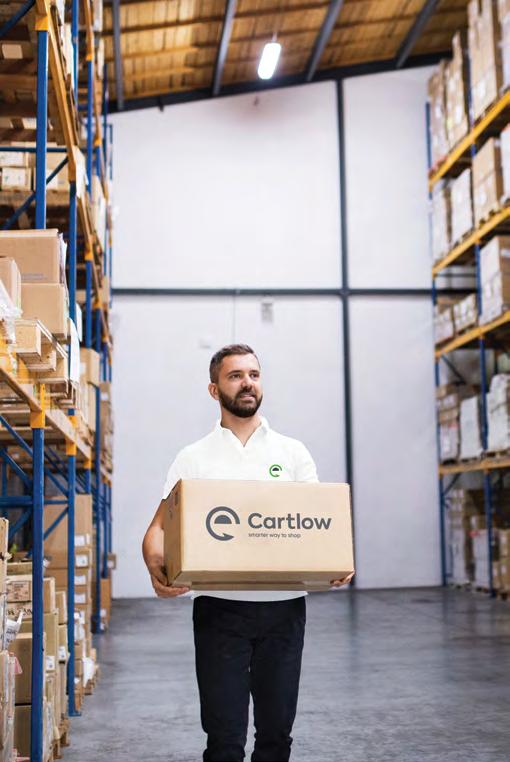
Relatively, eCommerce is a rapidly growing industry and a continuous growth in this industry results in an increased volume of returns, overstock, and aged items.
With re-commerce, businesses will be able to extend the overall product life cycle of the items they are selling which will contribute to improved return of investment while setting the foundations for a flourishing circular economy and improved environmental footprint, and these factors can be the defining line of a company’s success or failure.
Relatively, eCommerce is a rapidly growing industry and a continuous growth in this industry results in an increased volume of returns, overstock, and aged items. There are several factors which lead to the high return percentage rate of products, and these include consumers receiving a damaged item, a product that looks different than originally displayed, or even receiving the wrong product. In addition, there are other key factors which contribute to overstock and aged stock, these include seasonality, product cycle and out of stock concerns by the seller; all of which lead to increased storage cost, cashflow freeze, and expiration of products stored on the shelves.
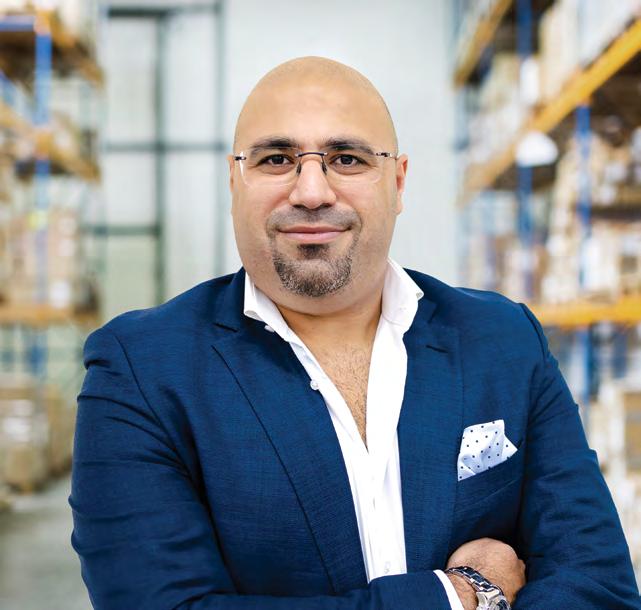
Mohammad Sleiman, Founder & CEO at Cartlow
This is mainly where reverse logistics comes in armed with an advanced API integration mechanism which addresses and resolves such challenges faced by businesses. Re-commerce solutions, such as the ones provided by Cartlow, help in maximising product recovery through

various sales channels where returns will end up in the hands of satisfied customers instead of landfills.
For the time being, the ‘classified’ channel is considered the only channel for the sale of preowned items for consumers, and this is where re-commerce bridges this gap by providing more value propositions, which entails logistics, returns, and warranty to the used products.
Finally, reverse logistics is essential to a successful circular economy model because it contributes to businesses - distributors and retailers - on a larger scale by helping them get rid of their old and returned stock while managing their returns and insuring better retrieval rates. As a solution, it also helps businesses optimise their conversion rate at new product launches by offering consumers trade-ins of their old products or devices, and consequently this cycle results in cutting costs and improving overall business operations.
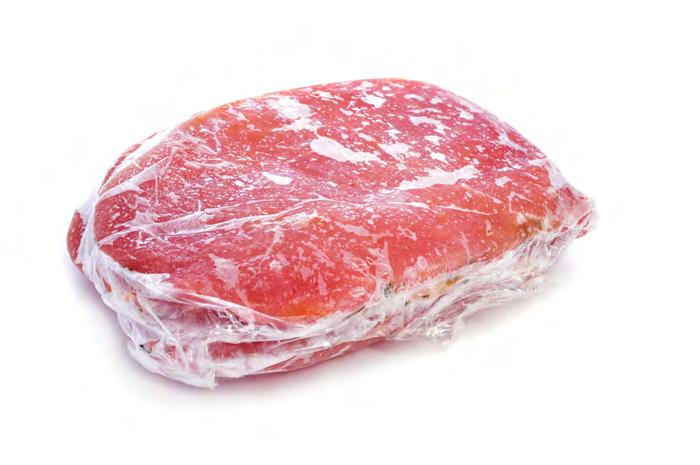
The Finance Director at Elfab Co shares how the pandemic has accelerated the demand for online grocery shopping services and the need to have an online platform dedicated to frozen products
Tell us about Elfabshop and what gap are you looking to fill in the market?
We launched Elfabshop in 2018 to enter the online home delivery business. For over 40 years, Elfab Co. has provided its customers across the UAE with high quality chilled and frozen meat, frozen poultry, and
seafood products. These customers include hotels, restaurants, and supermarkets. We source our products from across the globe and have long-standing relationships with high end suppliers. Having an online presence was a natural next step for our business. We wanted to bring the same high-
quality items to the home chefs, BBQ enthusiasts, and really anyone who enjoys cooking. We had also been listening to customers who wanted home delivery and had some different product needs, as well as monitoring overall industry trends.
What effect did the pandemic have on your business?
The pandemic accelerated online ordering and home delivery services across many sectors in the region. At that point, we invested additional resources to serve our customers better and expand the business. Based on our experience over the past year, we expect eShopping to continue to remain popular. Some customers appear to be stocking up on basic items while others continue to shop on a more frequent basis but are adding additional items to their orders.
We believe that once customers receive great products at sharp prices and prompt delivery, they will continue to purchase from that vendor.
What differentiates you from your competitors?
Our focus is on customer safety, and our extensive range of products along with highly competitive and sharp prices. All these factors when combined give Elfabshop an edge over any other platform. Also, our offerings are backed by 40 years of experience in the meat industry.
Are you also serving the B2B sector?
Our plans are to continue to expand in this online and home delivery business. We are here to serve both the retail and business sector across the UAE for the foreseeable future.
What are your most selling products?
Our most popular product categories are chilled lamb and beef products, and frozen poultry items. Our frozen chicken breast and thigh products, chicken leg quarters, chilled lamb
leg and lamb rack, and chilled beef tenderloin items are also in high demand. For special occasions and meals, customers indulge in our chilled veal products.
Our chilled beef Wagyu products continue to remain popular. We bring products from a wide range of countries across the globe including Australia, New Zealand, Holland, Brazil, South Africa, and the US. We are continually looking for products that will meet our high standards. We also have weekly deals and promotions on our website. Delivery is quick – we can get orders out that same day or the next day.
Compared to a retail outlet, do you see a surge in online shopping?
Elfabshop does not have a retail presence for the B2C sector. Online shopping has become increasingly popular and will continue to grow. Advances in technology and changes
in consumer shopping patterns will drive this growth. This will be an interesting area to monitor over the next few years.
Being an eCommerce platform that caters to products that require low temperatures, how do you manage the logistics? In our business, the temperature of the product is critical. We deliver the product directly from our stateof-the-art cold store in our temperature-controlled vehicles directly to the customer. All our employees follow food management safety standards.
The internally recognised Hazard Analysis Critical Control Point (HACCP) system is a systematic and preventive approach to food safety. We are HACCP certified and have implemented all the necessary guidelines and procedures across our business. We are also ISO 9001: 2015 certified.

“OUR FOCUS IS ON CUSTOMER SAFETY, AND OUR EXTENSIVE RANGE OF PRODUCTS ALONG WITH HIGHLY COMPETITIVE AND SHARP PRICES.”

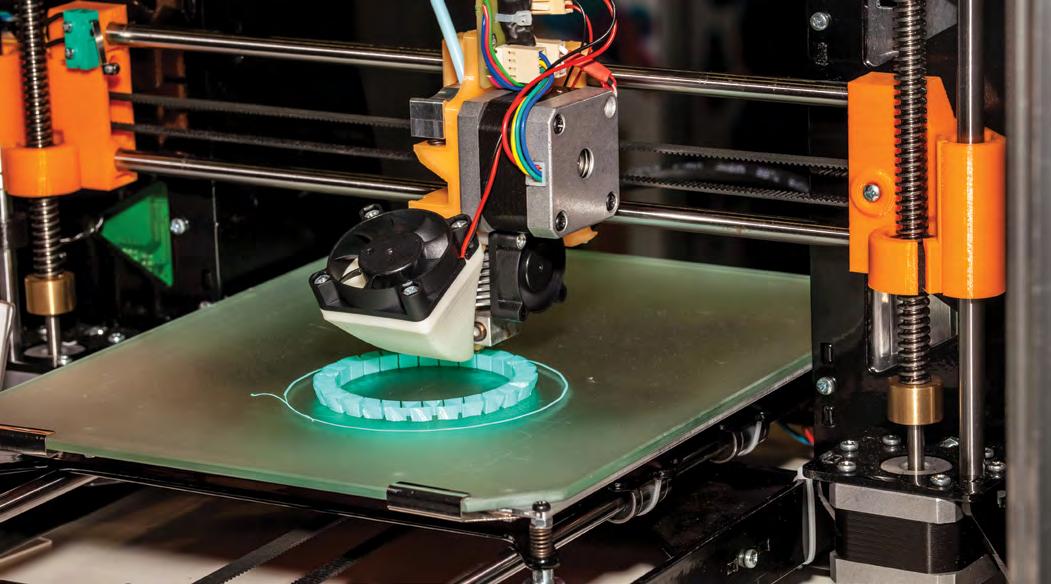
Dr. Shereen Nassar, Global Director of Logistics Studies and the Director of the MSc Logistics and Supply Chain Management Programme - Edinburgh Business School, Heriot-Watt University Dubai, shares insights on technological advancements that can benefit the humanitarian logistics supply chain
Technology plays an important role in our lives. The use of technology and its importance has been even more evident with the onset of the COVID-19 pandemic. However, while technology and techenabled solutions have been quick in being adopted across industries, there still needs to be a major push in many sectors.
Known for its use of manual processes and large amounts of data stored in different ways and different places, the logistics industry has perhaps the most to benefit from implementing new technologies.
According to a report by UNCTAD, the market for frontier technologies (a group of new technologies that take advantage of digitalisation) could grow to over USD3.2 trillion by 2023.
Technologies such as artificial intelligence (AI), the Internet of things (IoT), big data, blockchain, robotics, and drones all seem to have increasing prominence across sectors. In humanitarian logistics, in particular, there is a need to adopt technology to increase efficiency, productivity, and agility.
While 2020 has been the year of turmoil for the supply chain, humanitarian logistics has seen major disruption.
Although first invented in the 1980s, 3D printing has gained prominence over the last decade. It has been widely used in various industries and continues to revolutionise sectors such as the healthcare field. In the humanitarian supply chain, in-country NGOs in disaster-prone countries can be used to implement 3D printing.
Humanitarian aid organisations can provide 3D printing machines to local support hubs to overcome supply chain challenges such as importing finished products from distant countries.
“HUMANITARIAN AID ORGANISATIONS CAN PROVIDE 3D PRINTING MACHINES TO LOCAL SUPPORT HUBS TO OVERCOME SUPPLY CHAIN CHALLENGES SUCH AS IMPORTING FINISHED PRODUCTS FROM DISTANT COUNTRIES.”
From 3D printing water pipe fittings that may have been damaged in natural disasters to creating sanitisation pipes to its usage in printing medical supplies such as stethoscopes, surgical tools, or prosthetic devices – 3D printing can save transport duration, minimise warehousing issues and provide quicker relief in emergencies.
Unmanned vehicles
In the last few decades, we have witnessed an unprecedented increase in the frequency and complexity of disasters worldwide. This has put immense pressure on the weakest links in the humanitarian supply chain, hampering its efficiency. Natural disasters, pandemics and man-made disasters cause enormous damage to human life and infrastructures creating immediate needs for intervention by humanitarian aid oraganisations.
While research is still being conducted regarding its in-depth application in disaster relief, Unmanned Ground Vehicles (UGV’s) can survey disaster areas and provide detailed reports of the site to make it easier for humanitarian supplies to be transported. They can also carry large payloads which can help first responders, as they can be immediately deployed. In addition, Unmanned Ariel Vehicles (UAV’s) and drones are also important technologies that can support quick turnarounds and help reach locations that cannot be
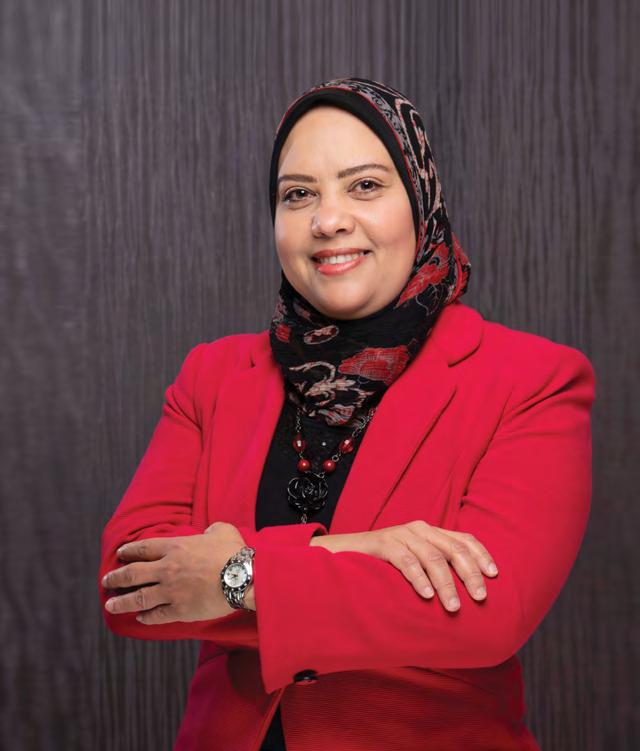
accessed via any other transport. Although UAV’s and drones can be used for small supplies such as medical products and can travel up to 60km/hr, newer ones are being built to increase their efficiency and ability to take an increased payload.
Blockchain technology
Blockchain has emerged as a extremely promising technology as it is an open, unchangeable, public ledger that can be accessed by numerous parties involved in the transaction and acts as a universal depository of all transactions between the involved parties. The global
blockchain technology market size was valued at USD3.67 billion in 2020 and is expected to grow at a CAGR of 82.4% from 2021 to 2028. Humanitarian supply chains generally lack visibility causing major challenges for the humanitarian aid community.
Disasters introduce immediate needs and put immense pressure on the availability and location of relief aid. Often there are several donor agencies involved thereby creating the need for better visibility of the supply chain. It requires traceability to avoid cargoes being diverted or stopped, which may occur due to political or other reasons.
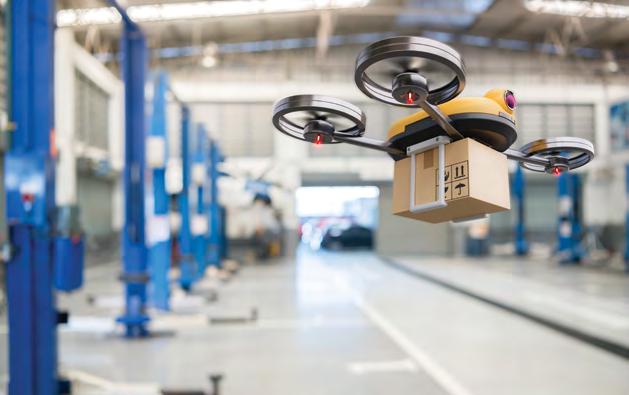
The advanced blockchain technology can provide fund and relief traceability, which would ensure all parties involved are kept updated on the journey of the relief aid. Blockchain technology can speed up transactions while minimising the possibility of fraud or data mismanagement. The blockchain ledger records transactions in a secure manner that cannot be changed. It allows any two parties to transact directly, and removes the need for third-party intermediaries such as banks.
An important technological advancement that has revolutionised many archaic methods, AI market is valued at USD327.5 billion globally. AI machines have the ability to learn from experience and adjust to new inputs and help in making sense of big data.
Disasters require large numbers of data to be accumulated. Collecting, processing, analysing and sharing this data can prove to be incredibly challenging in crisis situations, due to unpredictability, remote access, fragile public services, and, in many cases, poor telecommunications and limited connectivity.
Using technology powered by artificial intelligence can significantly reduce the time spent on gleaning the data for required information. In addition, it can prove exceptionally critical to first responders as they need access to realtime data in a short time frame. AI can
be used to analyse data and assess the impact of a disaster.
The analysis can inform their response and deliverance of life-saving assistance. AI can also ensure transparency among all those involved in providing and managing the aid – from the relief providers to governments and humanitarian institutes; it can be used to provide real-time updates on the relief’s journey and destination.
Unlike the commercial businesses, humanitarian organisations are at an early stage of exploiting the potential of big data analytics to make informed decisions. Understanding and quantifiying the impact of data-driven decisions will justify further investment and adoptions of big data innovation. Return on investment in big data analyt-
“COLLECTING, PROCESSING, ANALYSING AND SHARING THIS DATA CAN PROVE TO BE INCREDIBLY CHALLENGING IN CRISIS SITUATIONS, DUE TO UNPREDICTABILITY, REMOTE ACCESS, FRAGILE PUBLIC SERVICES, AND, IN MANY CASES, POOR TELECOMMUNICATIONS AND LIMITED CONNECTIVITY. ”
ics needs to be seen from a comprehensive value creation perspective. Once the total value of big data and analytics are visible to all the humanitarian stakeholders and can be measured, both financial and humanitarian costs of not using these data can be quantified and offer the rationale for accelerating the adoption.
The main challenge of utilising big data analytics within humanitarian sector is the lack of technical and IT skills, knowledge and capacity to use these applications and techniques in operational settings. Although, humanitarian decision-makers have valued and aimed to accelerate the adoption of predictive analytics to inform anticipatory action and better manage risks, translating the outputs of predictive models for timely and appropriate responses remains a challenge.
Tech-enabled solutions supported by big dat analytics are powerful and imperative in creating a faster, agile, and transparent humanitarian aid and relief community. These technologies can support disaster-stricken areas with supplies required and help with long-term solutions that can be critical in the time of pandemics and other catastrophes.


You need the power, reliability and versatility to do the impossible every day. And come back and do it again tomorrow.
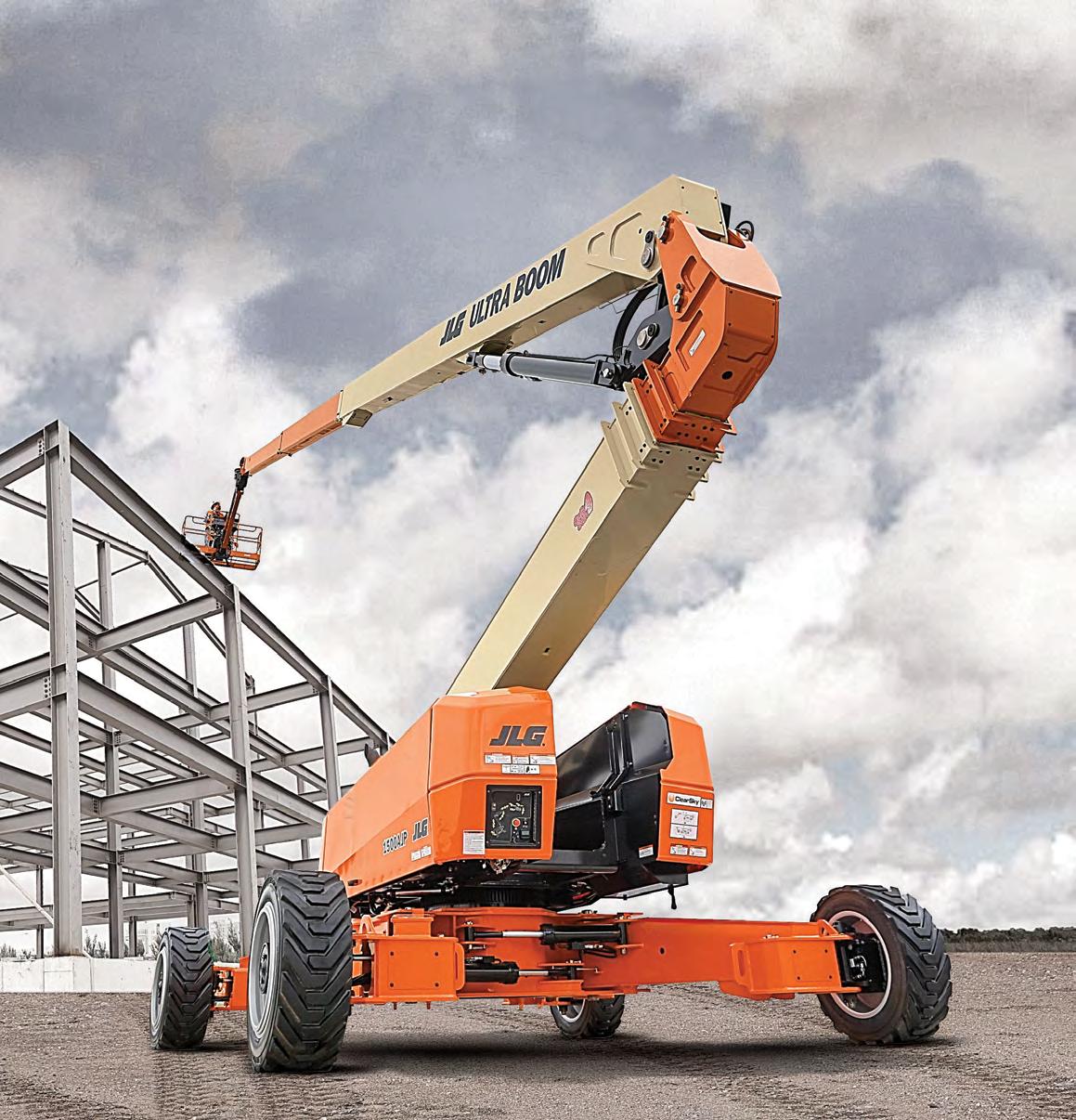

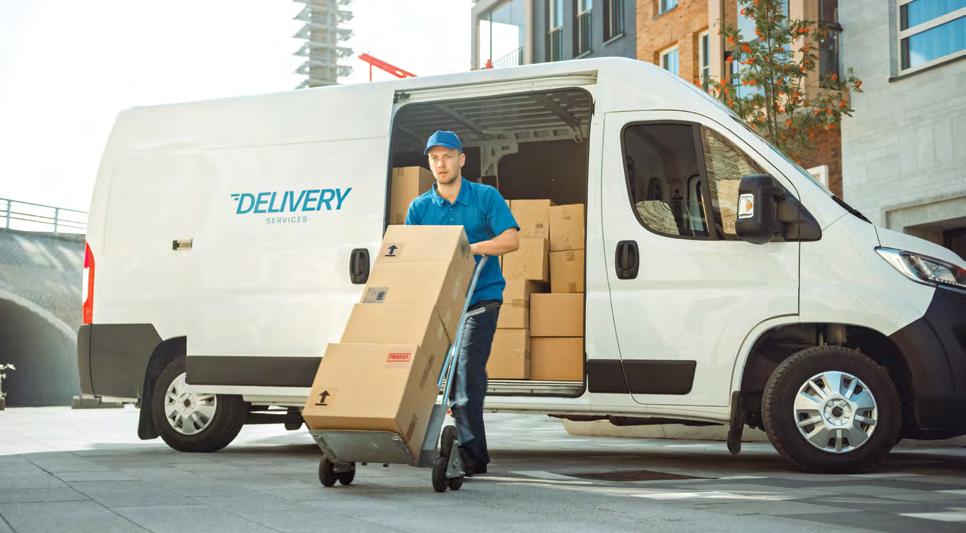
The UAE and Saudi Arabia lead the eCommerce growth in the Middle East. In 2020, these two countries contributed to 75% of the eCommerce sales in the region
According to a report titled, ‘eCommerce Sector in the UAE 2020 insights’, the UAE eCommerce sector emerged as the fastestgrowing economic segment in the Middle East in terms of value sales, supported by rising digital connectivity, infrastructure and substantial growth in consumer electronics, apparel, and footwear.
The report was launched by EZDubai, a dedicated eCommerce zone in Dubai South, in partnership with Euromonitor International - the world’s leading provider for global business intelligence,
market analysis and consumer insights - and Jones Lang LaSalle (JLL), a professional services firm that specialises in real estate and investment management. The findings examined the dynamic changes in the eCommerce market and presented a regional overview of the sector, evaluating its growth and future opportunities, taking trends as well as key major growth drivers into consideration, including COVID-led digital transformation and technological advancements that are set to reshape the industry moving forward.
In his comments, Mohsen Ahmad, CEO of the Logistics District - Dubai South,
said: “eCommerce continues to be an upward trend in the UAE, and this is a great opportunity for logistics players to expand their operations and capture the untapped potential of cross-border e-commerce.
“The sector played a major role in boosting Dubai’s economy and that of the UAE, consolidating the emirate’s position as a regional hub for eCommerce by attracting leading movers and creating a sustainable ecosystem for a number of corporations.”
He added: “The transition to online payment and the transformation of technological capabilities into quicker, safer and personalised experiences are among the key trends affecting regional eCommerce. EZDubai holds an important role as the first operational eCommerce zone in the region; and we are pleased to share the latest developments of this sector with our industry players.”
The findings revealed that the eCommerce growth in the Middle East is mainly driven by the UAE and Saudi Arabia (accounting for 75% of total eCommerce sales in 2020) due to the high purchasing power, expanded usage of social media, and smartphone penetration rates compared to other regional countries.
According to the report, storebased retailing is expected to grow by a CAGR of 1% over the 2019-2024 period, while eCommerce is forecast to grow by a CAGR of 19% over the same period. Apart from the impact of COVID-19, online penetration in the Middle East is forecast to double to 6% by 2024, compared to 3% in 2019.
Hussein Doughan, General Manager of Euromonitor International in Dubai, said: “The digital revolution has been rewiring retail for years, leading to new business models, commerce ecosystems and channels for reaching and engaging consumers. The COVID-19 pandemic accelerated this transition, as eCommerce became the default option for many homebound consumers.”
Euromonitor International projects that half of the absolute value growth for the global retail sector over the 20202025 period will be digital. That equates to USD1.4 trillion in absolute value growth as more goods are sold online. To put that projected eCommerce growth in context, that would be roughly the size of the total value of products sold across all retail channels just five years ago.
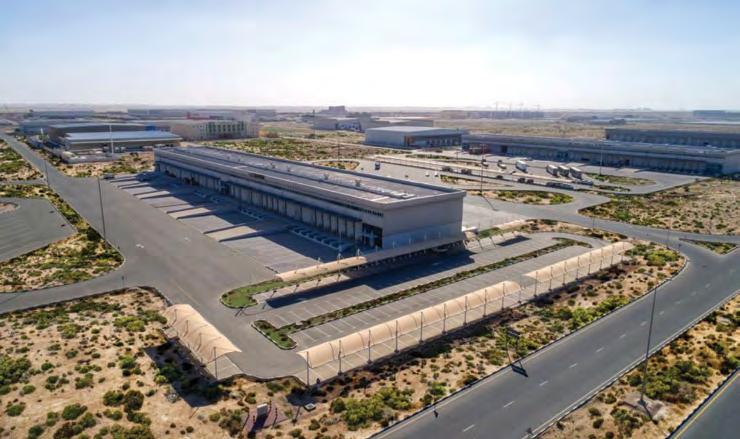
He added: “The eCommerce sector in the UAE and broader Middle East region is poised for growth. Euromonitor International’s Digital Connectivity Index, measuring a country’s digital landscape over time, reveals that the UAE is outpacing its emerging market counterparts on the index given its well-developed eCommerce infrastructure, coupled with its tech-savvy population.”
In line with its continuous effort to present insightful facts about the impact of eCom-
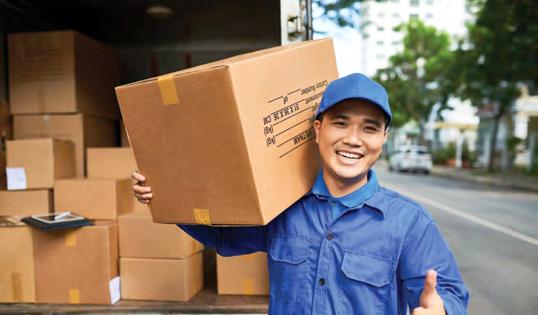
merce on the retail logistics sector, JLL found that since the outbreak of COVID-19, eCommerce penetration doubled, increasing from 3% in 2019 to 5% in 2020 across the region. Retailers with established eCommerce and digital platforms performed significantly better than brick-and mortar outlets, which faced pressure during the lockdown periods.
Also, it was reported that the region benefited from a solid and well-established infrastructure. According to the World Bank’s Logistics Performance Index (LPI) 2018, the UAE ranked 11th globally and the first regionally in terms of the efficiency of its customs, strong infrastructure, quality of logistics services, tracking and tracing. This has supported the country’s position as a leading logistics and e-commerce hub.
Thierry Delvaux, CEO of JLL MEA and Turkey, said: “The global real estate market continues to be impacted by technology and behaviour because of COVID-19, which has undeniably accelerated
the pace of digitalisation. This is particularly evident in the retail sector where consumers are shopping online at a much greater frequency than ever before.
“As a result, retailers have been forced to reimagine themselves to adapt to the changing needs of a society that is now more dependent on e-commerce. We are pleased to have been able to collaborate with EZDubai and Euromonitor to share insights on the trends driving the retail logistics market and look forward to supporting entities in the region tap into the transformative growth potential of this sector.”
EZDubai, was designed to attract leading eCommerce companies and create a benchmark with its infrastructure. The eCommerce zone, that was launched in January 2019 by HH Sheikh Mohammed bin Rashid Al Maktoum, Vice-President and Prime Minister of the UAE and Ruler of Dubai, aims to promote the emirate’s position as a hub for regional eCommerce.
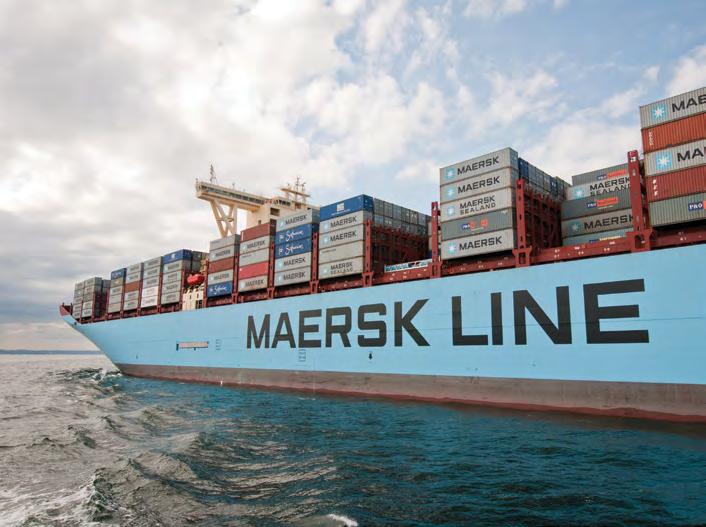
Maersk’s new digital tool, Emissions Dashboard, consolidates emissions data across all transport modes and carriers, enabling customers to set a baseline and find opportunities to optimise their emissions footprint
A.P. Moller - Maersk is further assisting its customers with decarbonising their supply chains with the launch of an Emissions Dashboard.
The Emissions Dashboard is an analytical data tool where customers are provided with carbon footprint measurements from their entire supply chain, giving a detailed emissions overview whether their products are transported via truck, train, plane, or vessel.
With an emissions overview companies will be able to disclose emissions information to the public, covering all their container flows.
Vincent Clerc, CEO of Ocean & Logistics, A.P. Moller – Maersk, says: “As our customers trust Maersk with a wider part of their supply chains, they also expect from us that we assist their climate actions through sustainable end-to-end offerings.
“An increasing share of our customers are setting ambitious sustainability
goals, making emissions visibility critical to document performance towards these targets. The Emissions Dashboard will ensure full visibility for our customers to leverage on their journeys towards decarbonised supply chains.”
Designed as a one-stop-shop, the Emissions Dashboard conforms to the GLEC methodology to calculate emissions and it handles emissions data from all carriers involved in the end-toend supply chain – not only emissions data from Maersk.
The analytics provides customers with the opportunity to get a detailed overview of their opportunities to lower emissions from the transport of their products. At the same time the data creates a solid basis for logistics emissions reporting which can be used in corporate sustainability reports. Around half of Maersk’s 200 largest customers have set – or are in the process of setting – ambitious sciencebased or zero carbon targets for their supply chains.
The Emissions Dashboard has been tested by 10 key customers of Maersk who have provided valuable and positive feedback. Among these are leading science-based agricultural technology company Syngenta.
“Maersk and Syngenta have a joint vision to significantly reduce our carbon footprint for transport and logistics. We know that to succeed, we will need high-quality emissions data. The clear visuals and insights provided by the Emissions Dashboard offer an accurate picture of our emissions, guide our decision-making, and help us identify the most impactful changes we can make.
“Our collaboration with Maersk moves us towards a more sustainable future,” says Ai Ma Ong, Global Logistics Capacity Manager, Syngenta. The Emissions Dashboard is part of Maersk’s commitment to global sustainability – a commitment that is shared with an ever-increasing number of customers, consumers, and investors alike.
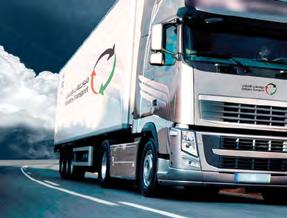
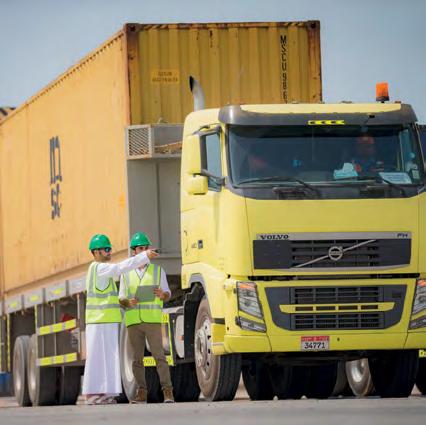





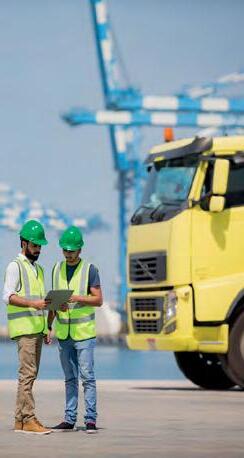












MORE UPTIME, MORE COMFORT, MORE SECURITY, MORE FUEL SAVINGS
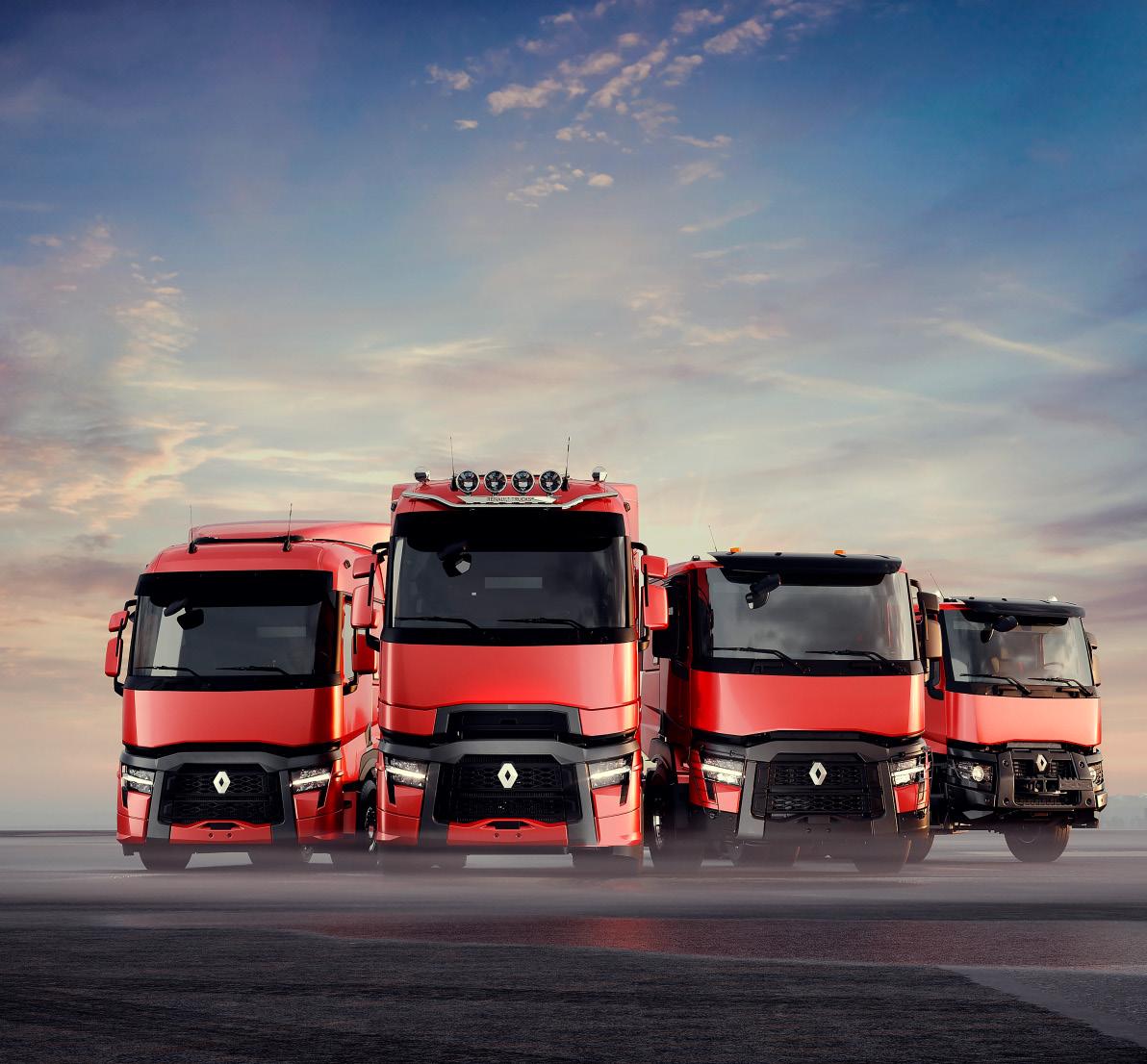
One of the best steering column of the market, new super comfortable bunk, monitoring vehicle’s components in real time, and more. We have gone a long way to support you better.
Find out more in your local Renault Trucks dealership.